Easy Boneless Jokbal Recipe: Korean Braised Pork Trotters
This is the easiest Korean Jokbal recipe in the world. No need to soak the meat for 6 hours because this one uses boneless pork trotters. Just follow this recipe, and you’ll taste the exact same Jokbal(pork feet) you had at a Korean restaurant, honestly even better! Shall we start?
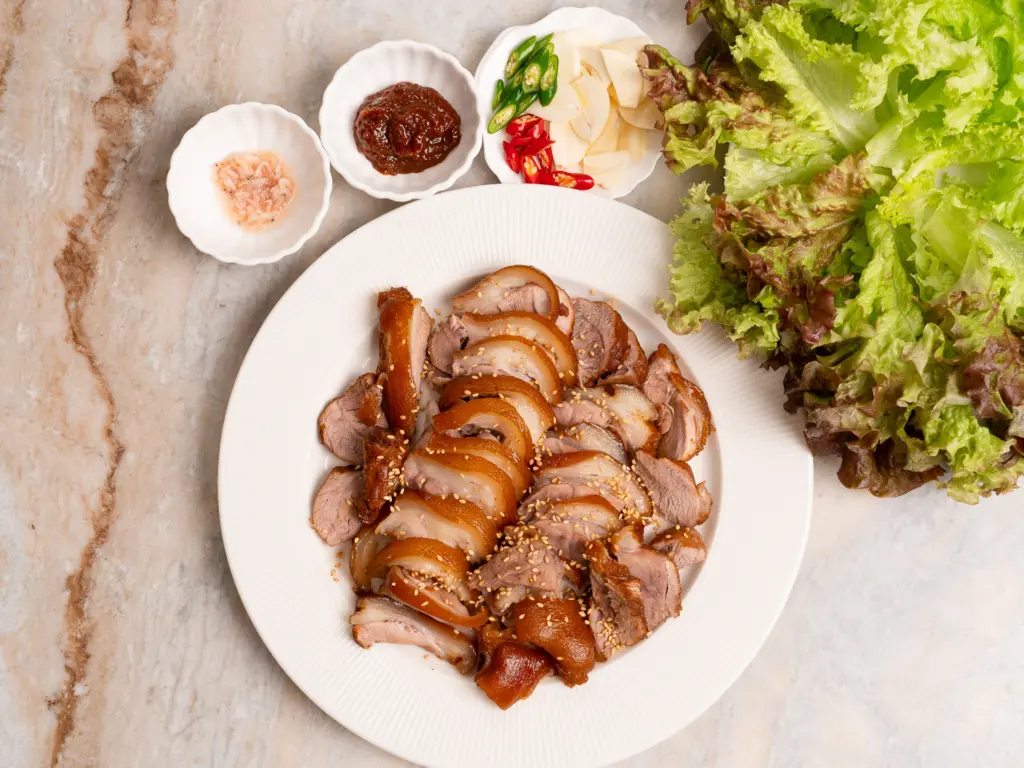
What Is Jokbal? 족발
Jokbal is a Korean dish made by boiling pig’s feet with soy sauce, garlic, ginger, star anise, and various spices. It has a savory and slightly sweet flavor with a rich aroma from the spices. The pig’s skin is cooked on top of the meat, giving it a chewy texture with juicy meat underneath, making it a delicious dish.
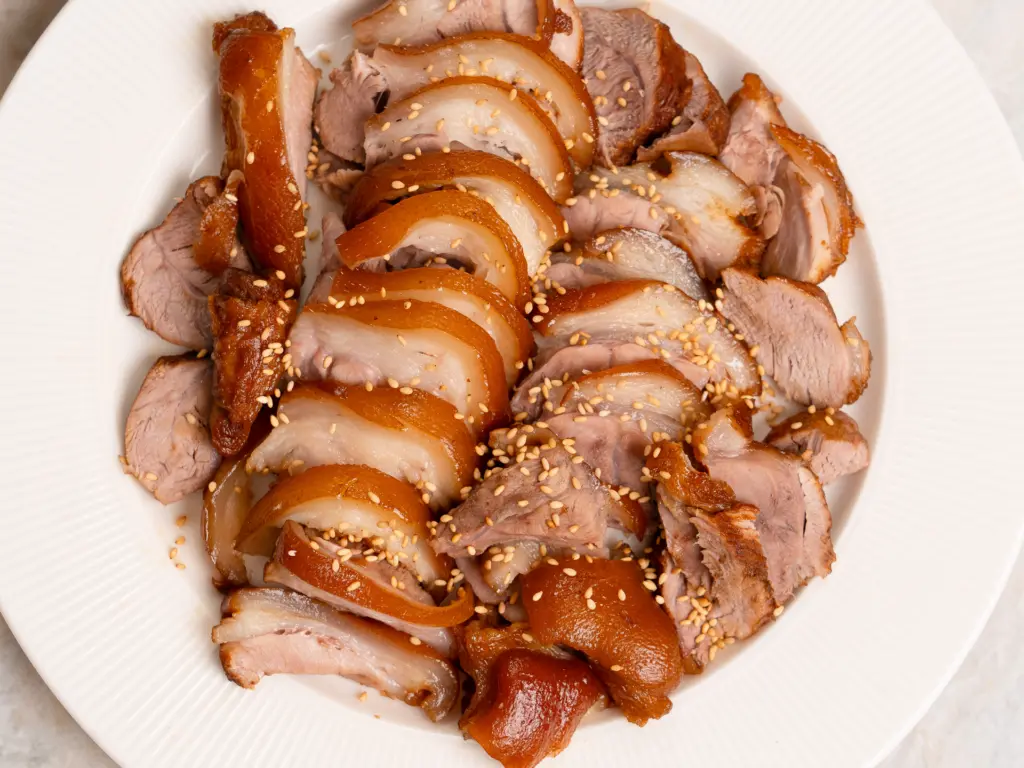
How Koreans Enjoy Pork Trotters
Koreans usually eat pork trotters either boiled in soy sauce or coated in a spicy-sweet sauce. Sometimes people eat only jokbal, and often they enjoy half jokbal and half bossam (boiled pork). It is typically served with shrimp sauce and ssamjang. People may dip the pork trotters in shrimp sauce, then add some ssamjang, or place the meat in a lettuce wrap with garlic and chili for a bite. Jokbal is often enjoyed as anju (Korean drinking food), and the drink most commonly paired with it is soju.
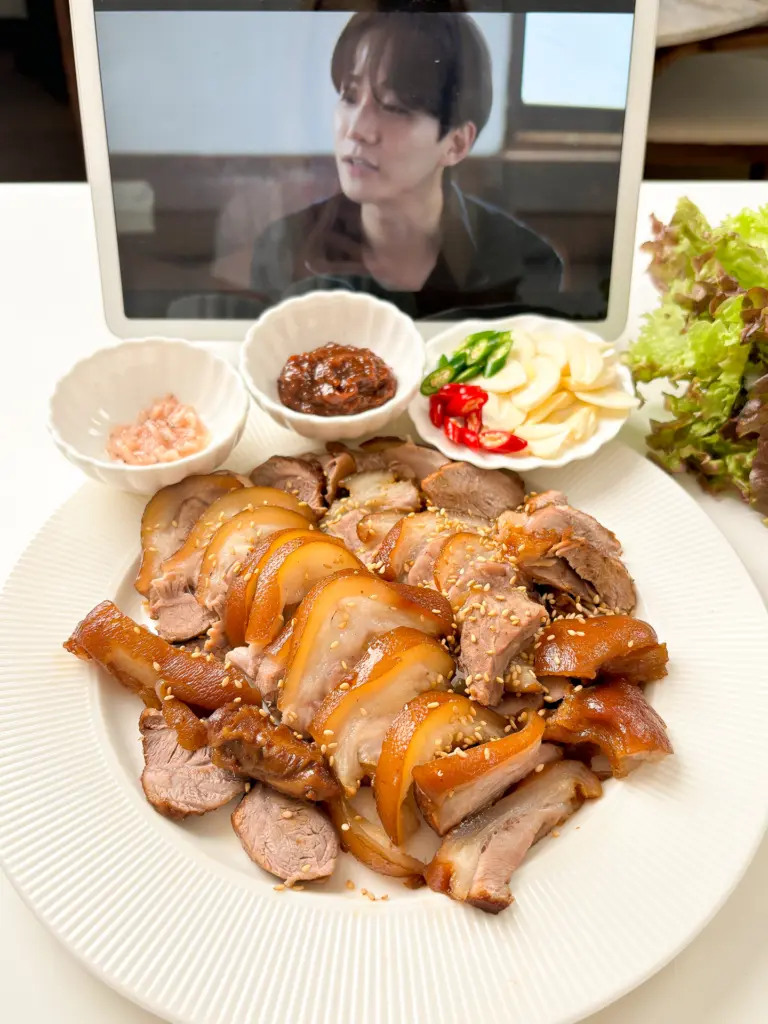
Why You’ll Love This Boneless Jokbal Recipe
No Need to Soak the Blood
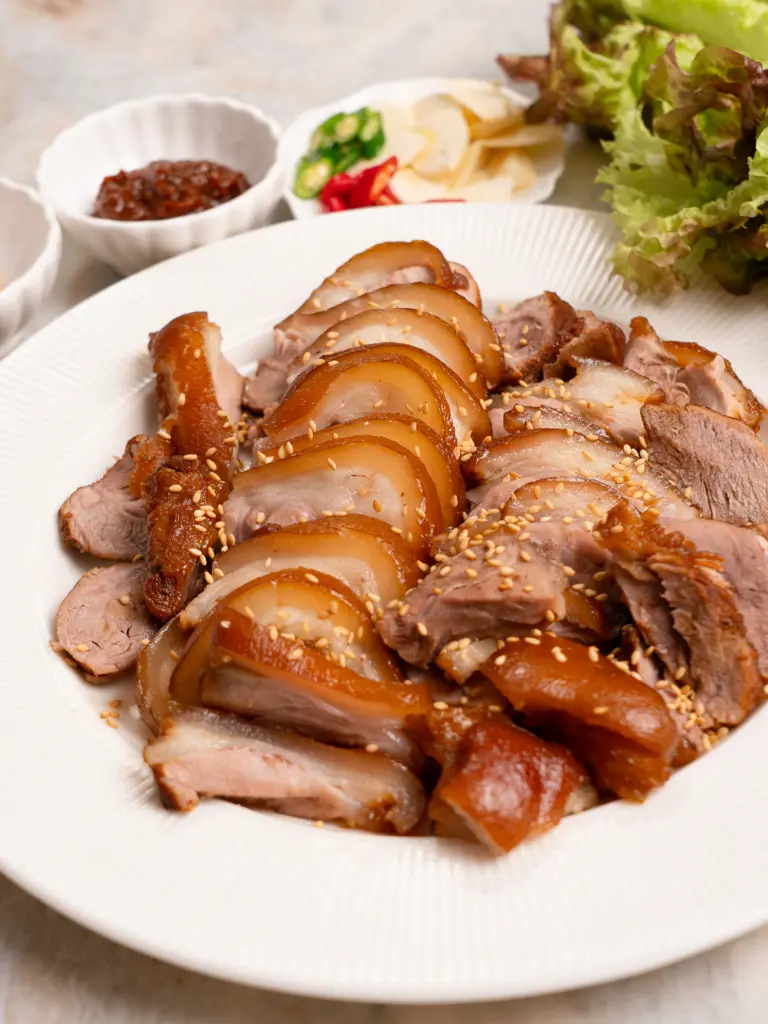
In typical jokbal recipes, the pig’s trotters are boiled with the bones intact, so it is common to soak them for about 6 hours to remove the blood. This helps eliminate the porky odor. However, by removing the bones beforehand, there is no need to soak the meat — you can cook it right away.
Quick Cooking Time
Since you don’t need to remove the blood, the pork feet recipe is much simpler and faster. Cutting the meat into boneless pieces also significantly shortens the cooking time. In total, you can make delicious jokbal at home in about 1 hour.
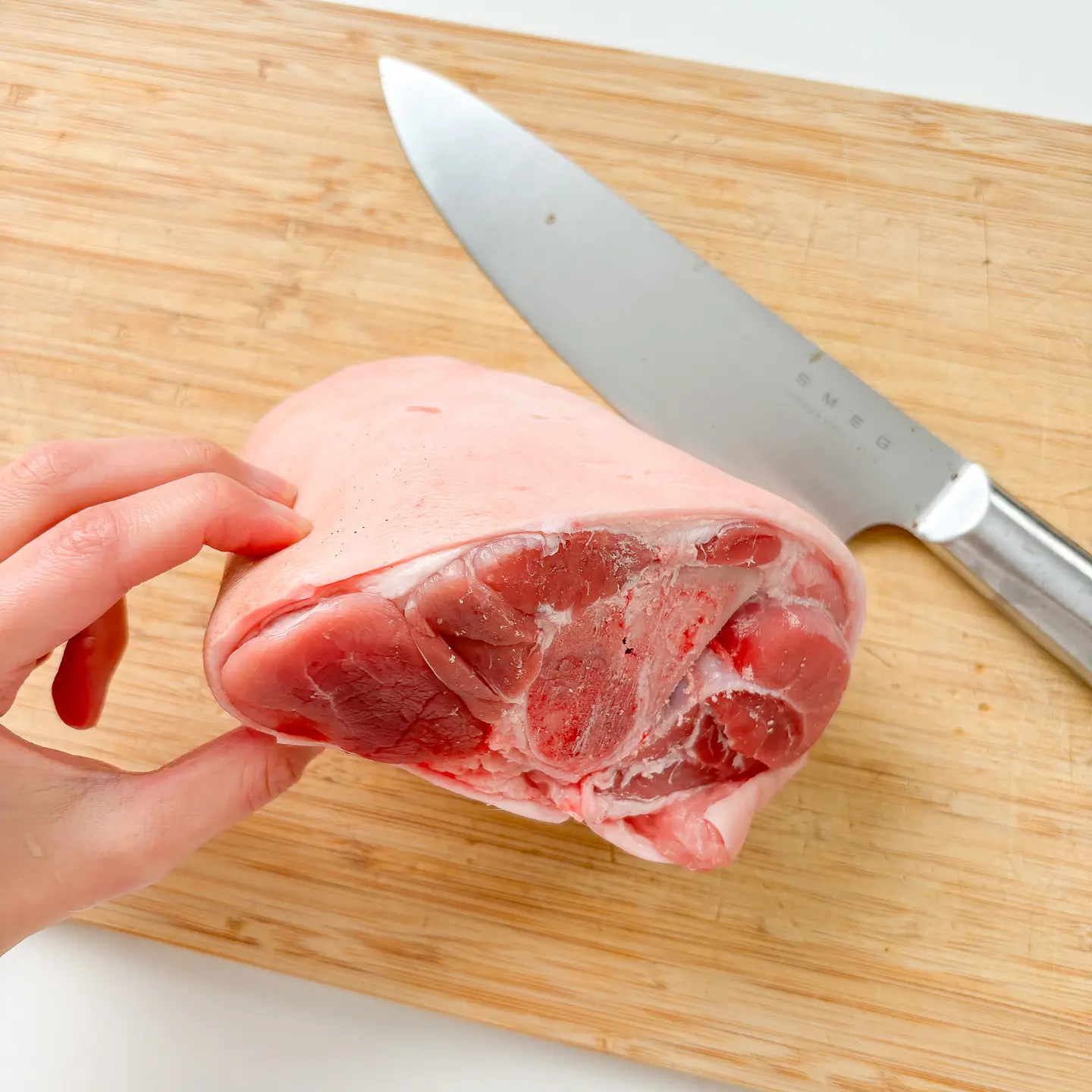
Easy Recipe
Even if you’re not confident in cooking, don’t worry. Just use the seasoning ratio I provide, add the pork trotters, and simmer for exactly 50 minutes. You’ll have restaurant-quality jokbal made by your own hands. I promise it’s that easy.
Affordable
Pork trotters are inexpensive in most countries. Whether in Korea or Europe, this cut is cheaper than most other cuts of meat. Making it at home allows you to enjoy the same dish for about 30% of the restaurant price and in much larger portions. Honestly, since you can use better cuts and higher-quality ingredients, home-cooked jokbal naturally tastes much better.
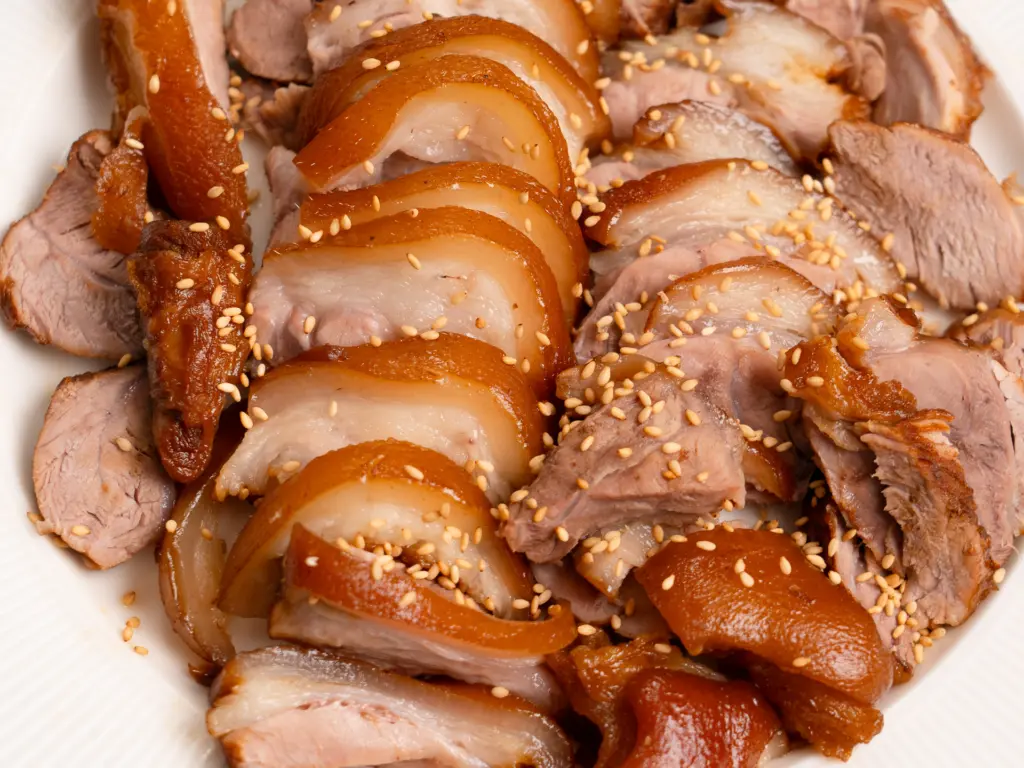
Ingredients for Korean Pork Trotters
Main Ingredients
- 1 whole jokbal (pig’s trotter): Make sure it has the skin attached.
- 2 onions
- 2 green onions
- 8 garlic cloves
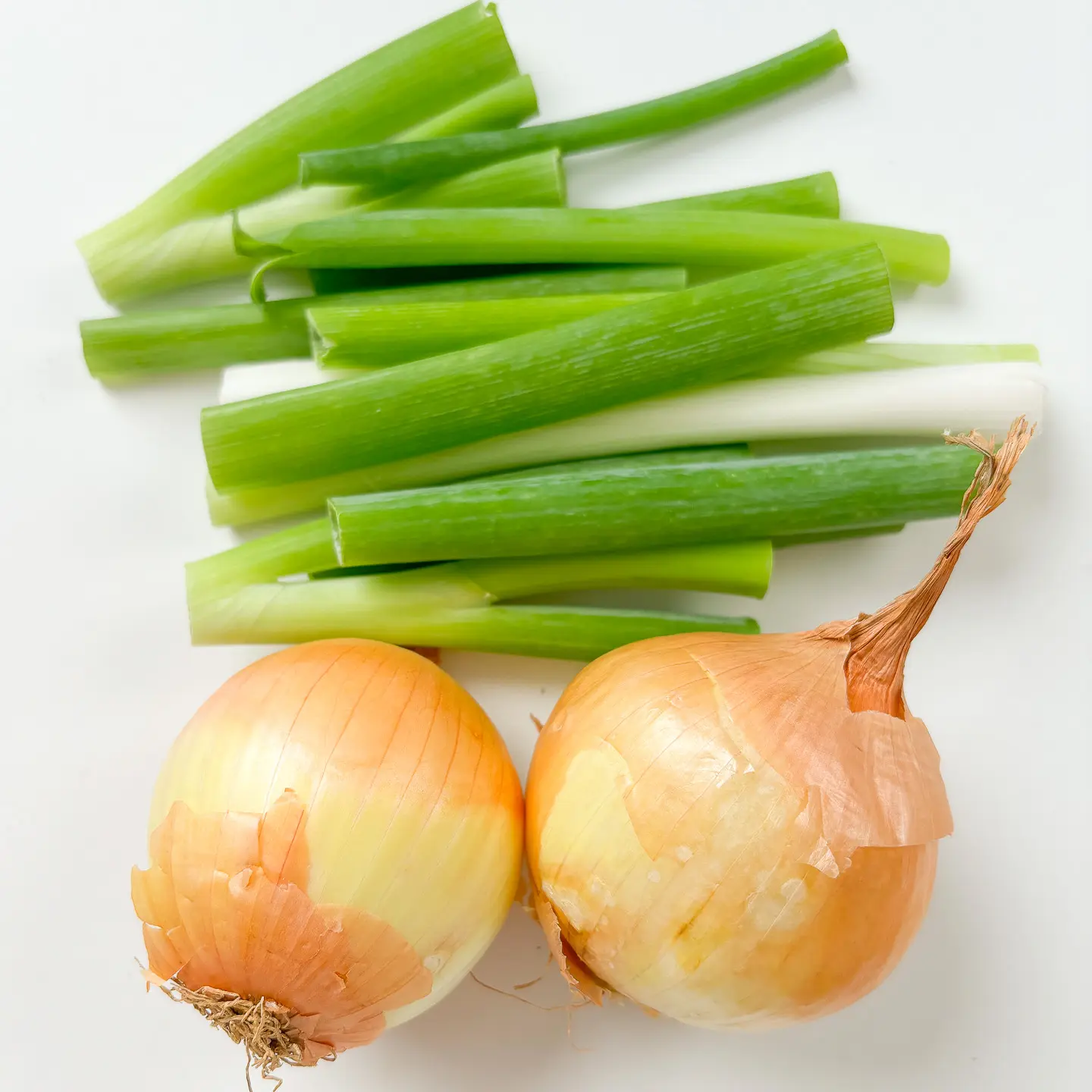
Spices
Since pig’s trotters have a strong porky smell, several spices are used to neutralize it.
- 6 star anise: The key spice. This is essential to get the authentic jokbal flavor.
- 1 cinnamon stick: Optional, adds a fragrant aroma to the pork trotters.
- 3 dried jujubes: Optional, adds natural sweetness and aroma. These small ingredients create depth of flavor.
- 2 tbsp sliced ginger: Ginger is one of the main spices that removes the gamy taste of pork.
- 1 tsp whole or ground black pepper: Whole pepper is ideal, but ground pepper works if you don’t have whole pepper.
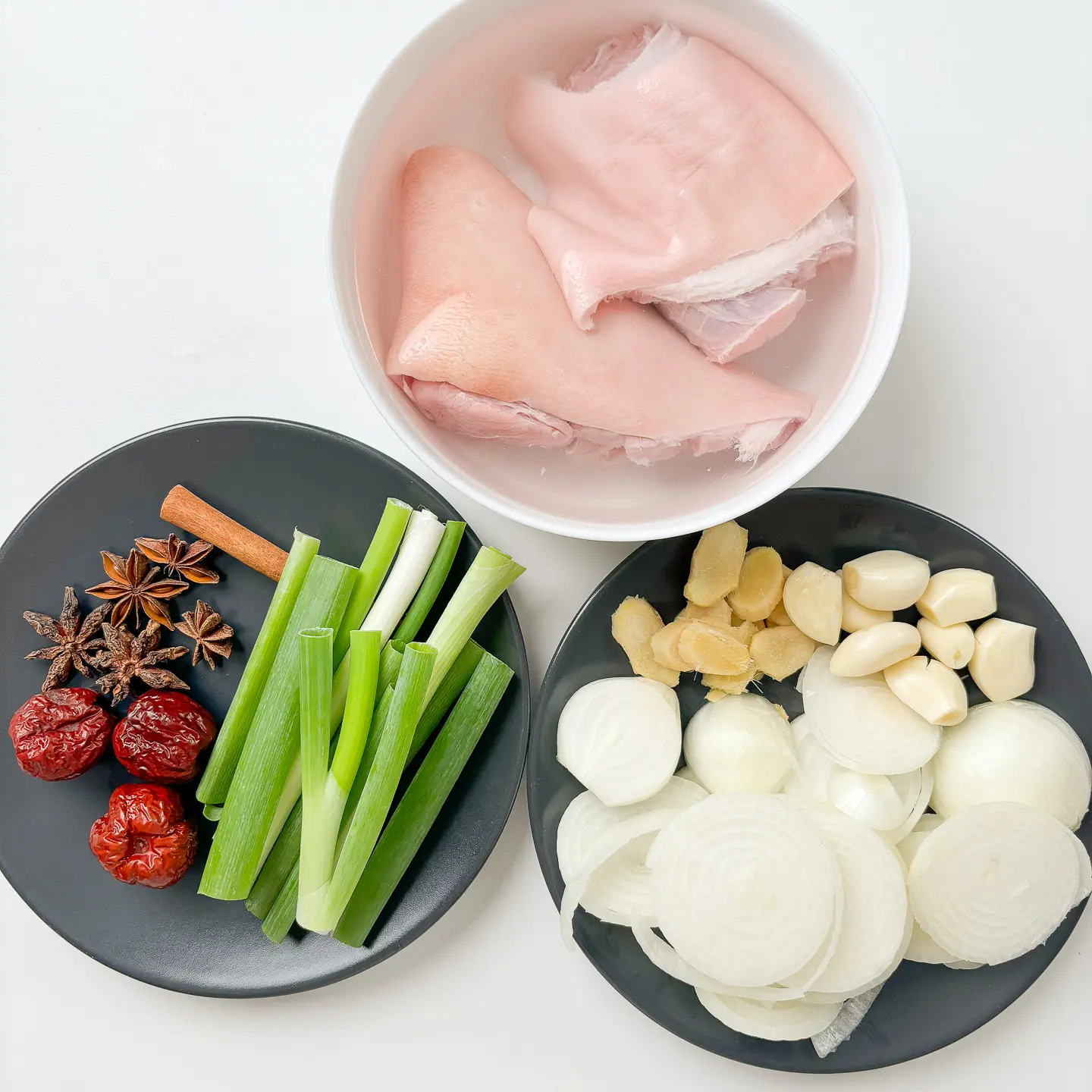
Braised Sauce
- 150 ml soy sauce: You can use Korean jin ganjang. If you want to learn more about types of Korean soy sauces, check my blog post below.
- 100 ml dark soy sauce: Chinese-style dark soy sauce (lao chou) adds sweetness and deep color to make the pork trotters look more appetizing.
- 50 ml soju: Pig trotters have a strong porky smell, so soju or cooking wine helps remove it.
- 120 ml sugar: It may seem like a lot, but after braising, the jokbal isn’t overly sweet. The sweetness balances with the saltiness of the soy sauce.
- 20 ml corn syrup
- 30 ml plum extract
- 300 ml water
- 1 tsp MSG: Optional, but essential if you want the same flavor as Korean restaurants. It significantly enhances umami.
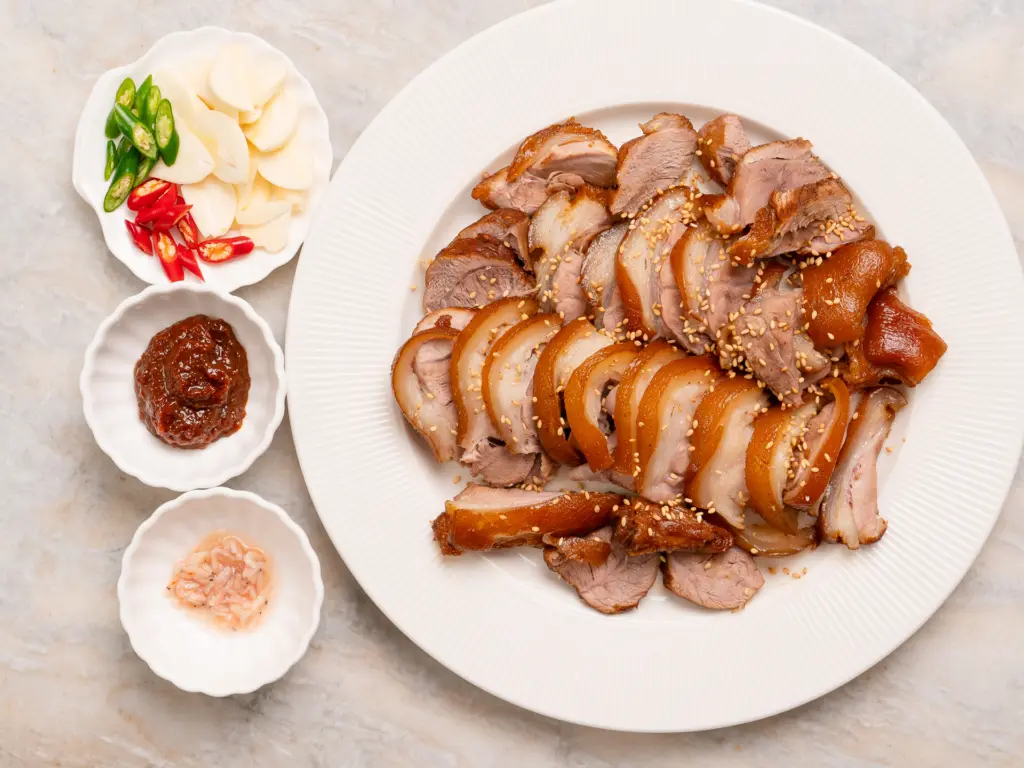
Substitutions
- Dark soy sauce (lao chou): Mainly for color. If unavailable, use jin ganjang with 1.5 tsp brown sugar.
- Soju: Essential for removing pork odor. Can be replaced with cooking wine, mirin, or other alcohol.
- Corn syrup: Can be replaced with honey or sugar, but it’s difficult to achieve the same glossy finish.
- Plum syrup: Can be replaced with honey or sugar, but plum extract adds aroma and slight acidity, enhancing umami. It’s highly recommended to get it for authentic Korean flavor.
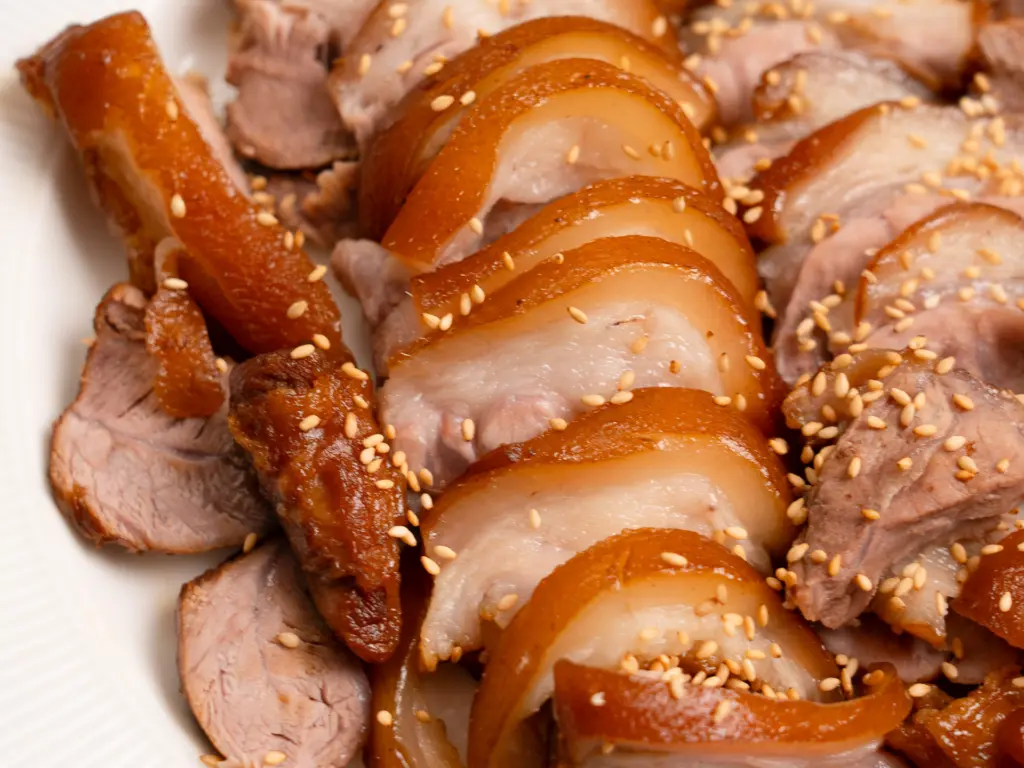
How to Make Jokbal Step by Step
Prepare the Meat
Remove the bones from the pig’s trotters, keeping the skin attached. There’s no need to soak the meat to remove blood. While you prepare the other ingredients, keep the meat in cold water.
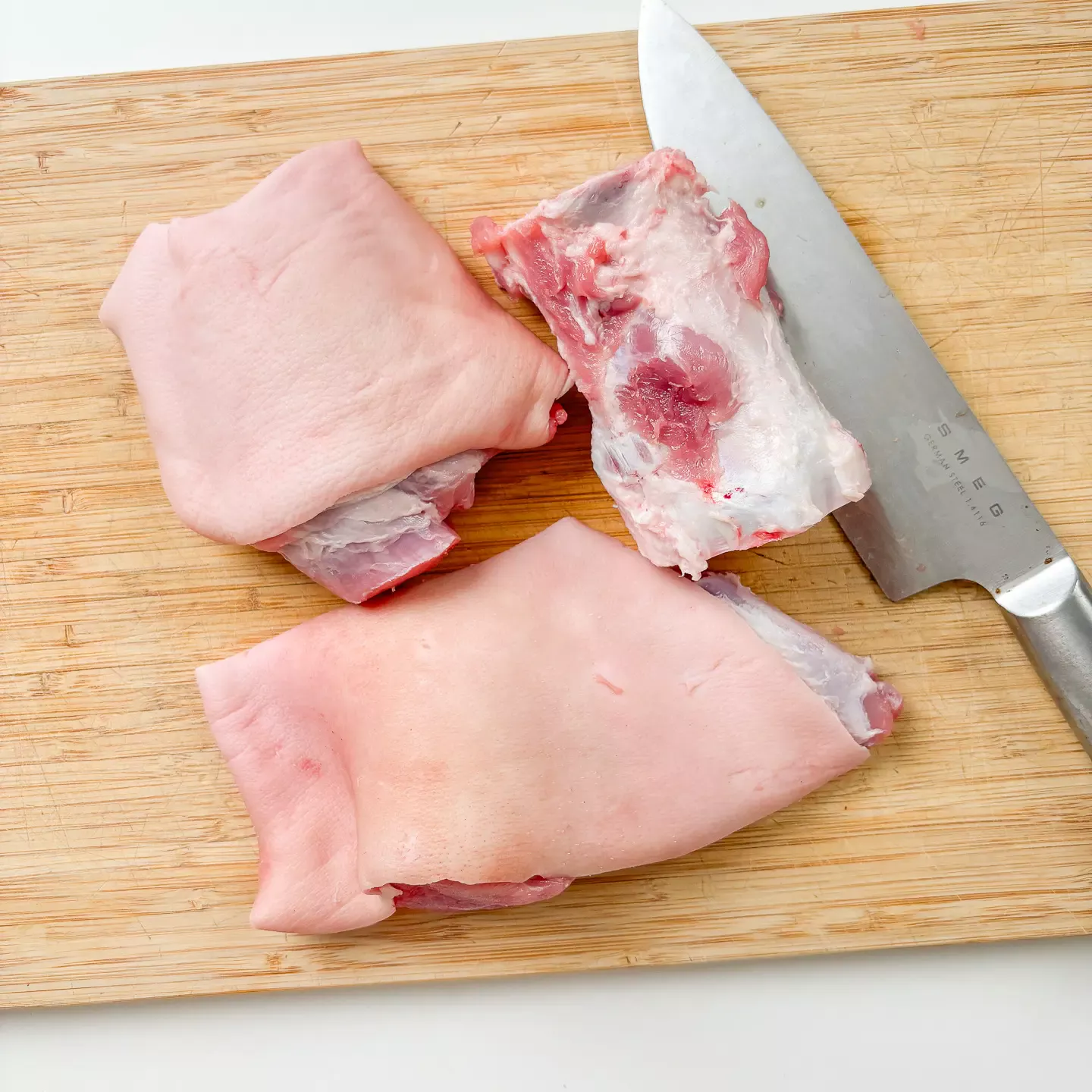
Prepare the Vegetables
Cut the green onions into large pieces. Slice the onions into 1.5 cm (½ inch) thick rounds. Lightly crush the garlic cloves with a knife and thinly slice the ginger.
Assemble in the Pot
Place the sliced onions at the bottom of the pot and lay the pork on top. Add the green onions, garlic, star anise, cinnamon stick, ginger, dried jujubes, and black pepper.
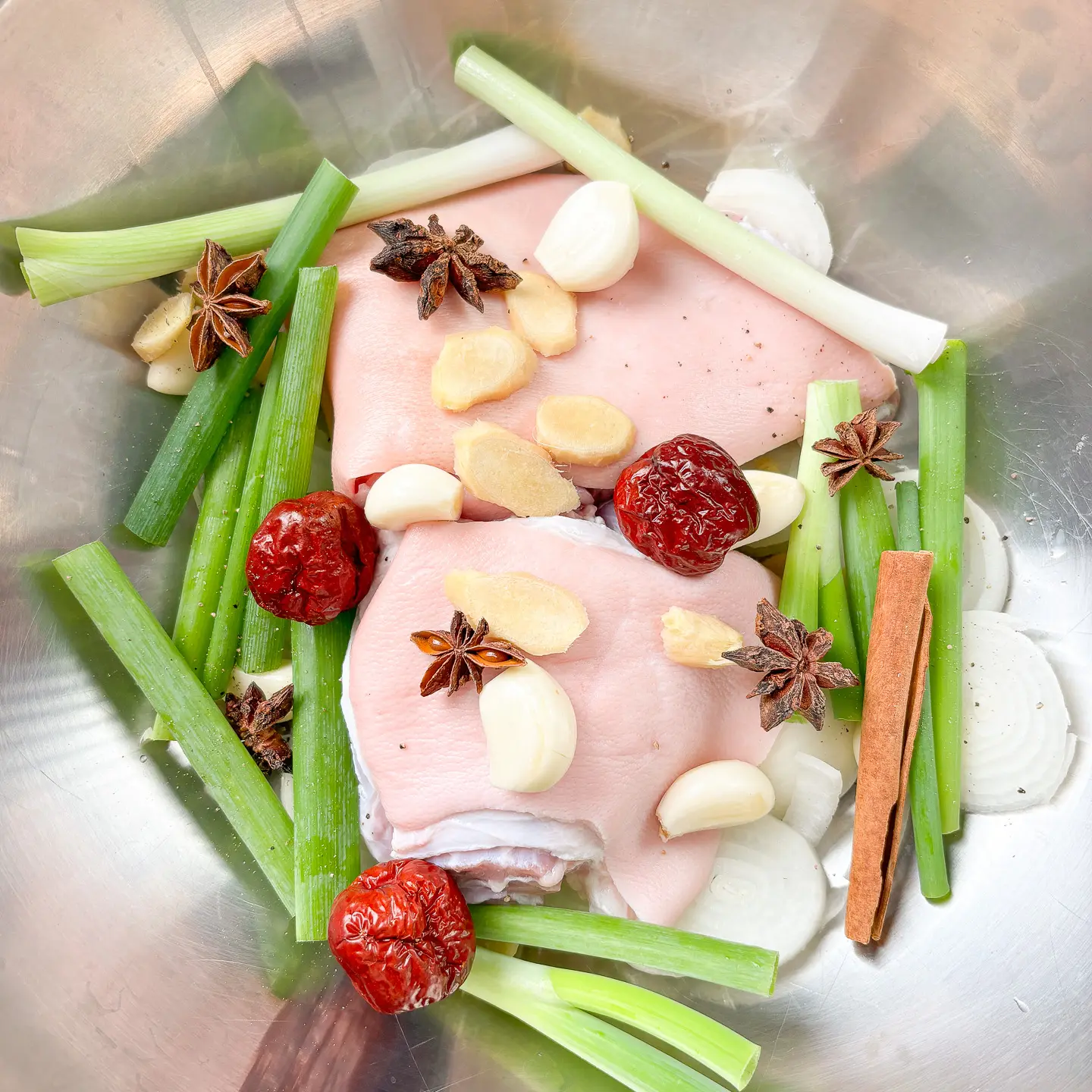
Make the Sauce
In a bowl, mix soy sauce, dark soy sauce, soju (or cooking wine), sugar, corn syrup, plum extract, and water. Pour the sauce over the meat. Add MSG if you want a restaurant-style flavor.
Simmer and Braise
Cover the pot with a lid and bring it to a boil over high heat. Once it starts boiling, reduce the heat to medium-low and simmer for 50 minutes. Turn the meat 2–3 times during cooking to ensure it cooks evenly.
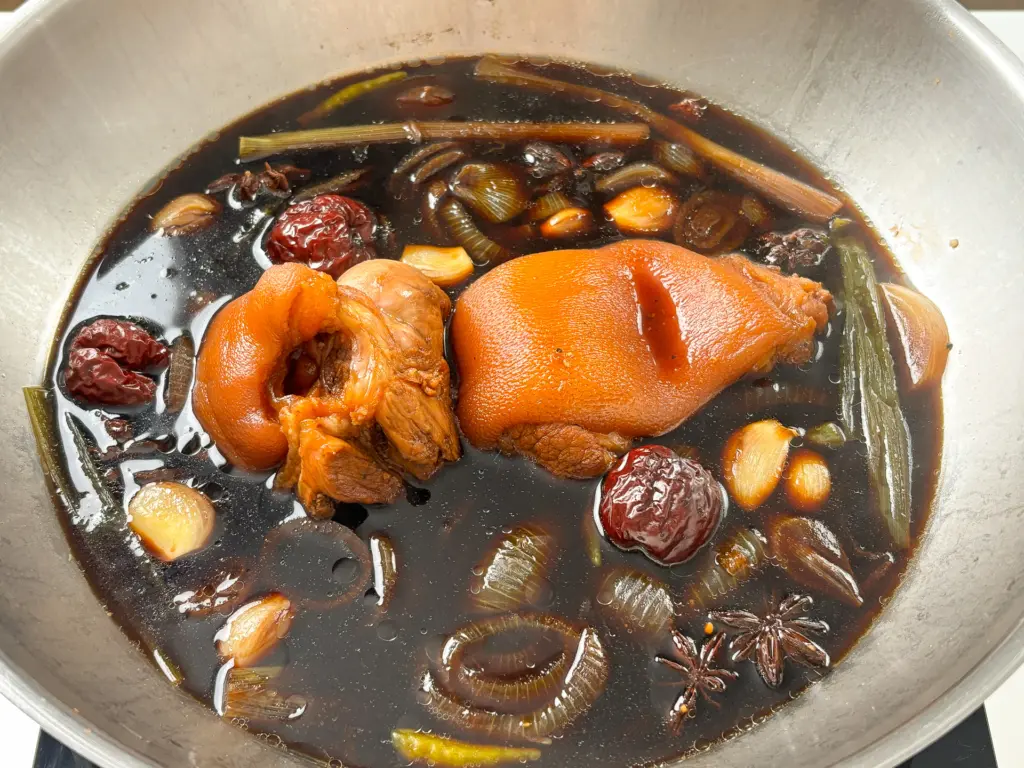
Rest and Slice
After cooking, let the pig’s trotters rest for about 15 minutes before slicing. This helps the meat stay firm and bouncy without falling apart.
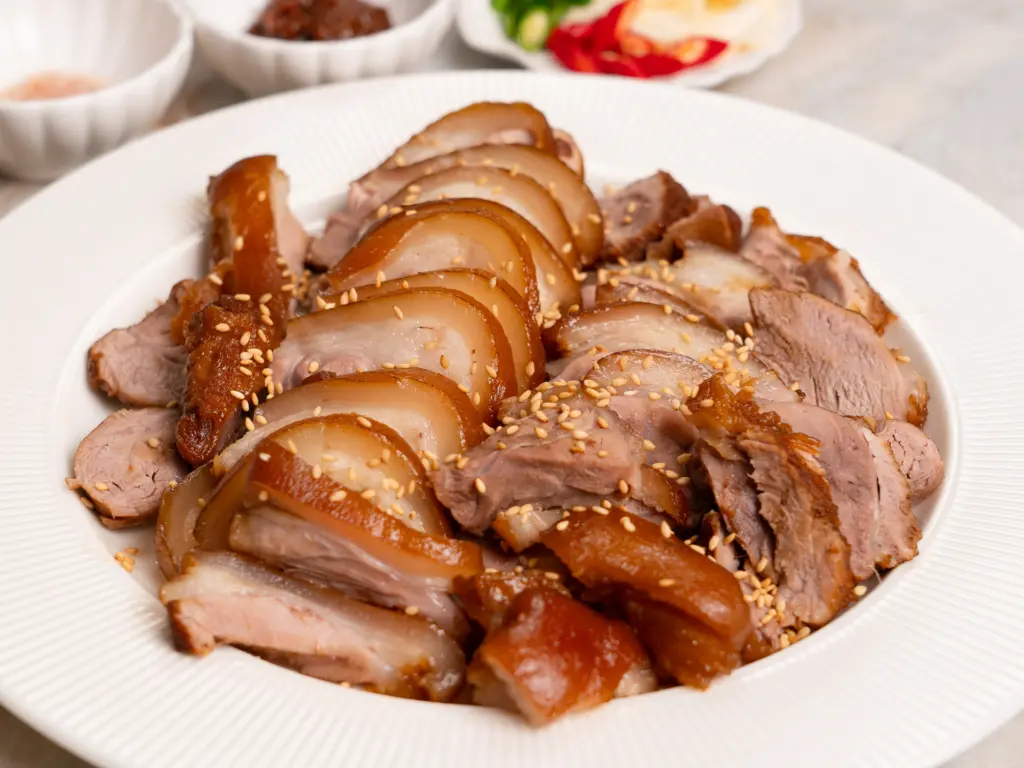
What to Serve with Korean Pig’s Trotters
Main
- Bossam: In Korea, pork trotters are sometimes eaten on their own, but it’s also common to enjoy them half-and-half with bossam (boiled pork belly). This is an easy bossam recipe for making moist and tender bossam right at home.
Sides
- Sauces: Prepare shrimp sauce and ssamjang for dipping. You can also dip the jokbal in the braising liquid, which is really delicious.
- Vegetables: Use lettuce for wrapping the Korean pig’s trotters in ssam (lettuce wraps).
- Bibim Makguksu: In Korea, it’s common to enjoy spicy, sweet, and tangy bibim makguksu (cold buckwheat noodles) as a side when eating Korean pork trotters.
- Rice: Steamed rice can also be served alongside.
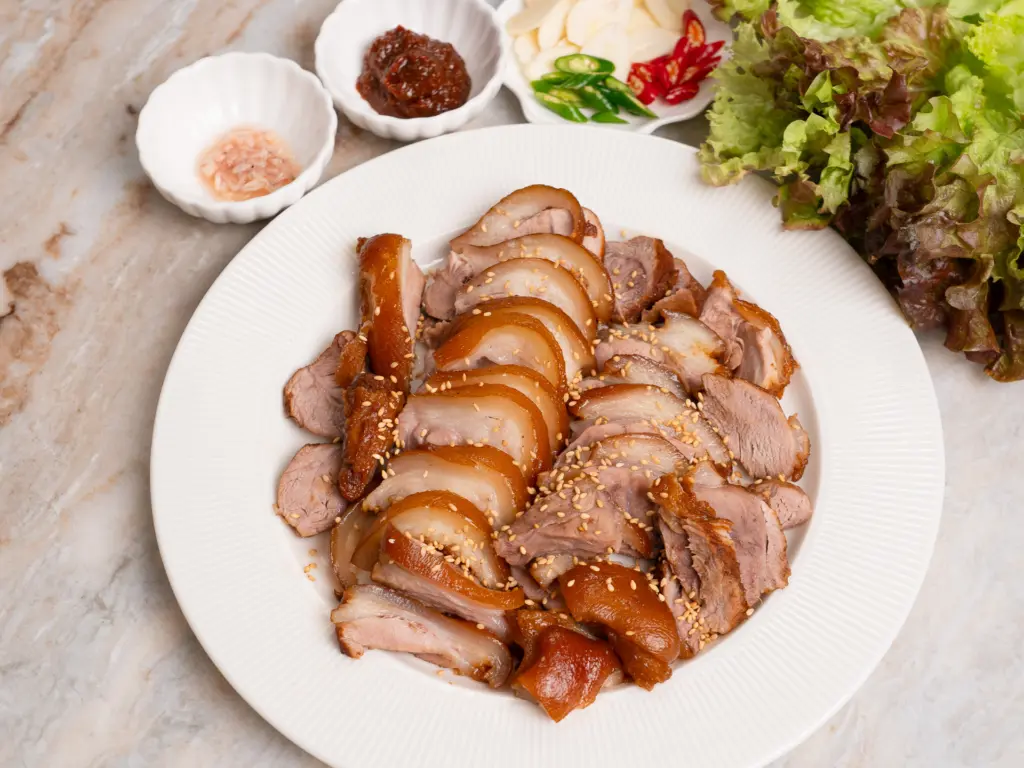
Pairings
- Soju: Korean pork trotters is a rich and fatty dish, making it the perfect anju (Korean drinking food) to enjoy with soju.
- Somaek: A mix of soju and beer, called somaek, also pairs very well with jokbal.
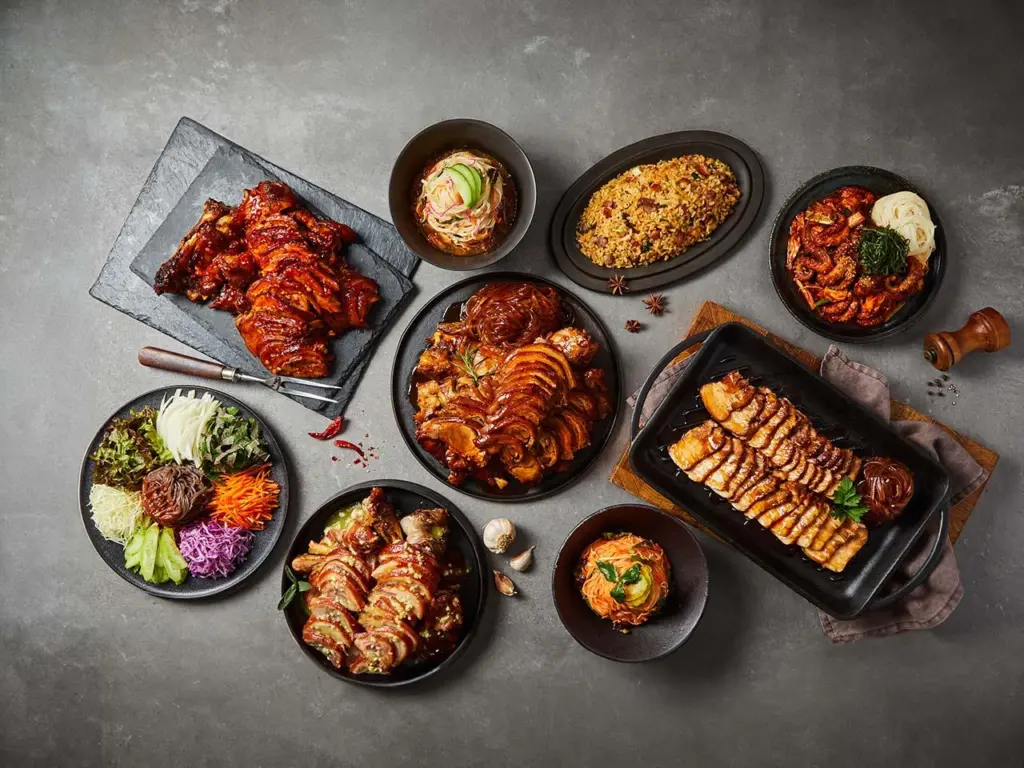
Tips for Perfect Jokbal
Spices
Spices are very important in jokbal because they help remove the porky odor and add fragrance. Using all the spices I include will give the jokbal more depth of flavor, but if that’s not possible, be sure to at least include ginger and star anise.
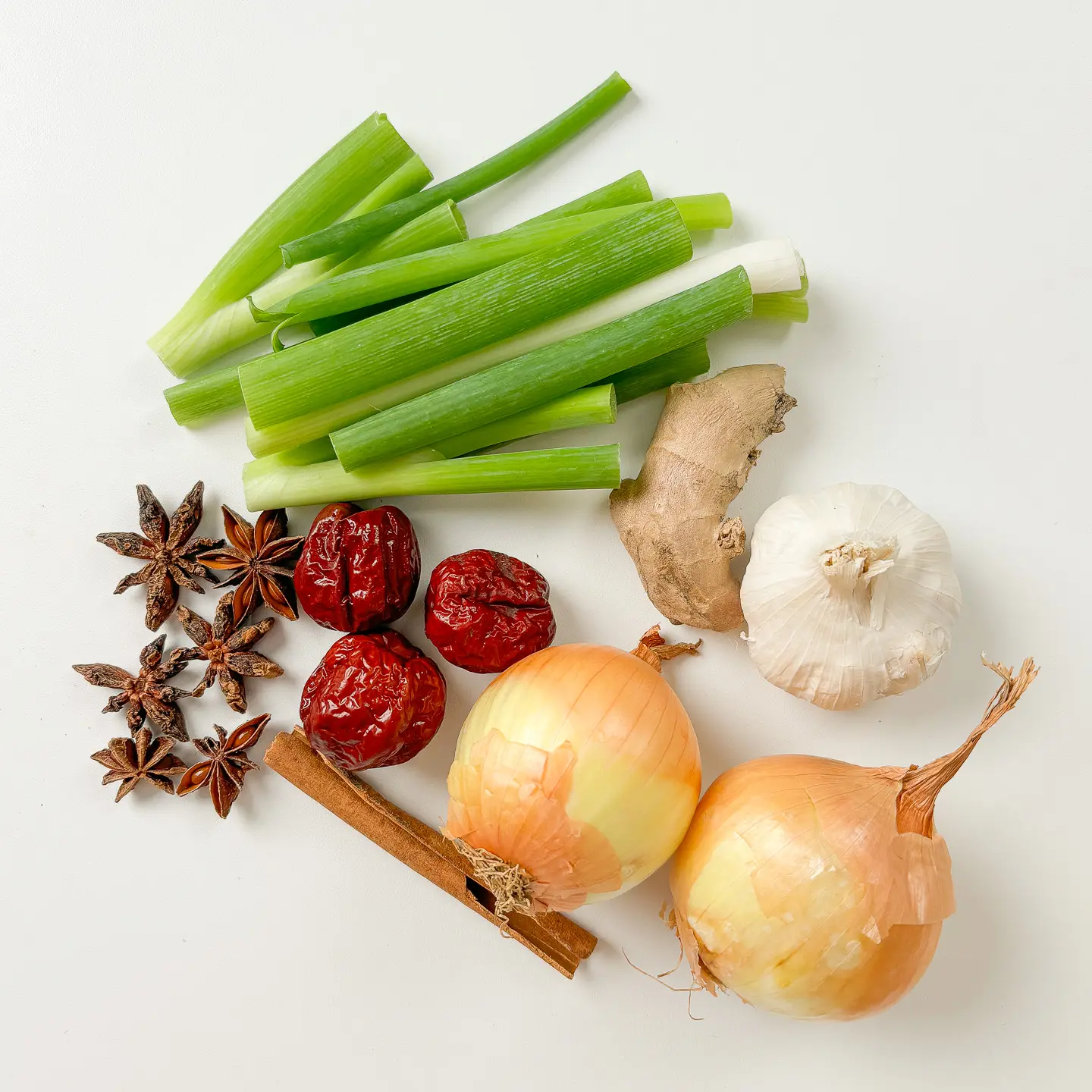
Heavy Lid
Using a pressure cooker can make the meat much more tender in a shorter time, but if that’s not an option, at the very least, cover the pot with a heavy lid while boiling the pork trotters to ensure the meat becomes tender.
Medium Low Heat
Once the water starts boiling, reduce the heat to medium low and simmer slowly. This helps trap the juices and cook the meat tenderly.
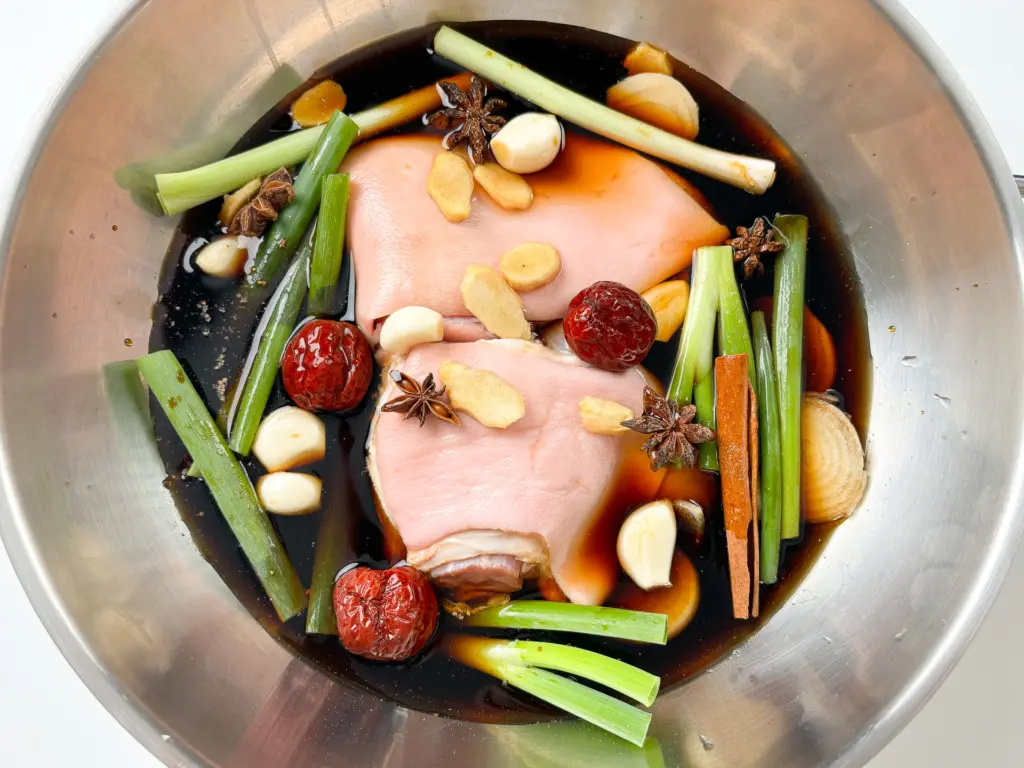
Resting
Let the jokbal rest for 10–15 minutes before slicing. This prevents the meat from falling apart and makes the skin chewier. Eating it warm gives a softer skin, while eating it after it cools makes the skin chewier — Koreans have very different preferences. I prefer to eat it warm, while my younger sibling likes it slightly cooled and chewier. If you want to eat it warm, rest for 10–15 minutes before slicing. If you prefer it chewier, let it cool for about 20 minutes.
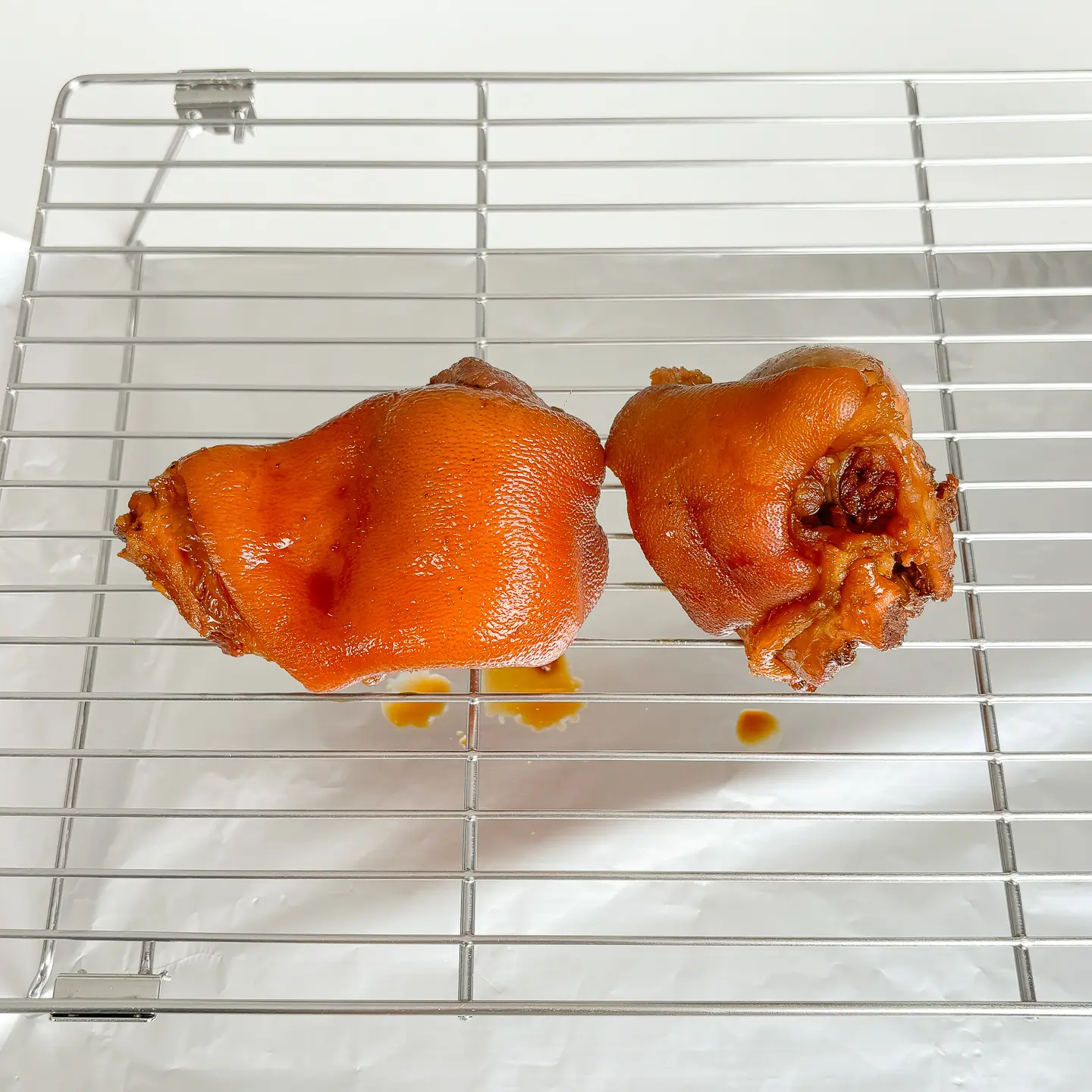
Storage and Reheating Tips
How to Store in the Fridge
Place the pork trotters in a container and cover it with plastic wrap before storing it in the fridge. It’s best to eat it within two days.
Best Way to Reheat
- Steaming: Place the pork trotters in a steamer and steam it once. This method preserves moisture, keeping it juicy and flavorful.
- Microwave: Place the Korean pig’s trotters in a microwave-safe dish, sprinkle 2 tbsp of water over it, cover with plastic wrap, and poke a few holes. Microwave for 1 minute 30 seconds to 2 minutes. Flip the meat halfway through for even reheating.
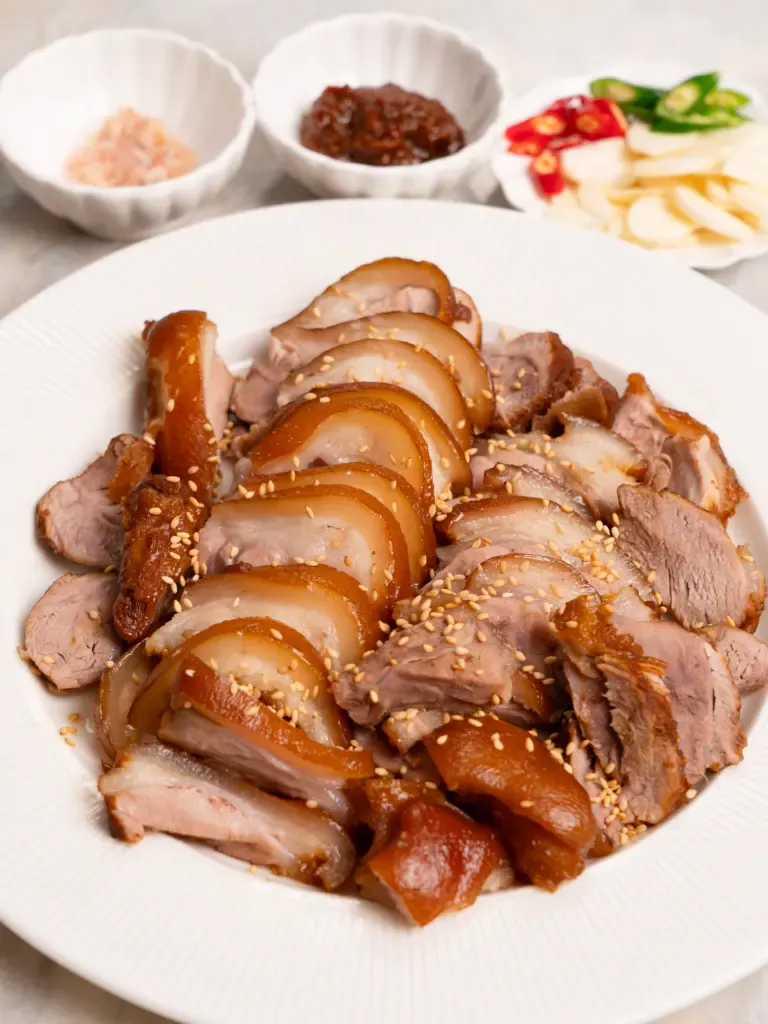
FAQ about Jokbal
What is Korean Jokbal?
Korean jokbal is a dish made by braising pig’s trotters in soy sauce and spices such as garlic, ginger, and star anise until tender and flavorful.
What are Jokbal made of?
It is made from pig’s trotters, usually with the skin attached, and cooked with a combination of soy sauce, sugar, spices, and sometimes alcohol to remove any porky odor.
How to eat pork trotters?
Jokbal is typically eaten with dipping sauces like shrimp sauce and ssamjang, or wrapped in lettuce with garlic, chili, and other toppings. It can also be paired with rice or bibim makguksu.
What’s the difference between Jokbal and Bossam?
Jokbal is made from pig’s trotters, giving it a chewy skin and rich collagen, while bossam is boiled pork belly, softer in texture and usually eaten with wraps. In Korea, it’s common to enjoy them half-and-half.
What can I substitute for dark soy sauce?
You can add jin ganjang (Korean soy sauce) with 1.5 tsp of brown sugar to get similar sweetness and color. The full recipe is available on this blog.
What is Jokbal sauce?
It is usually served with shrimp sauce and ssamjang. If you make it at home, dipping the pork trotters in the braising liquid is also really delicious.
Is Jokbal Chewy?
Yes. The pig’s skin is cooked together with the meat, giving it a chewy texture. This is a characteristic feature and is rich in collagen, which is good for the skin.
Is Jokbal healthy?
Pork trotters are rich in protein and collagen, which can help with skin and joint health.
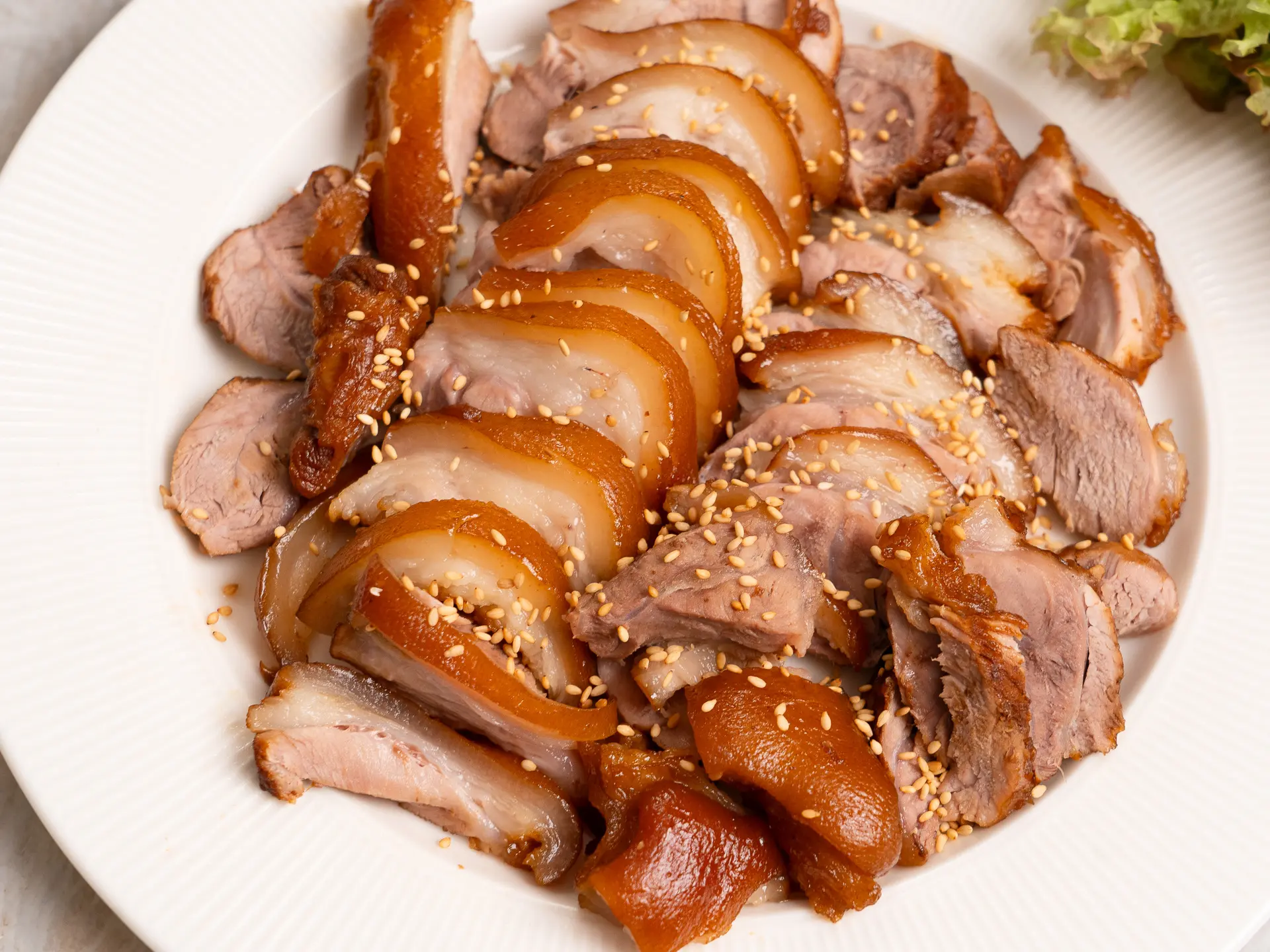
Easy Boneless Jokbal Recipe: Korean Braised Pork Trotters
Equipment
Ingredients
Main
- 1 whole jokbal (pig's trotter, skin on)
- 2 onions
- 2 green onions
- 8 cloves garlic
- 2 tbsp sliced ginger
- 1 tsp whole or ground black pepper
- 6 star anise
- 1 cinnamon stick (optional)
- 3 dried jujubes (optional)
Braised Sauce
- 150 ml Korean soy sauce (jin ganjang)
- 100 ml Chinese dark soy sauce
- 50 ml soju (or mirin, or cooking wine)
- 120 ml sugar
- 20 ml Korean corn syrup (substitute with honey or sugar)
- 30 ml Korean plum syrup (substitute with honey or sugar)
- 300 ml water
- 1 tsp MSG (optional, for restaurant-style flavor)
Instructions
Prepare the meat
- Remove the bones from the pig’s trotter, keeping the skin attached. You don’t need to soak the meat to remove blood.
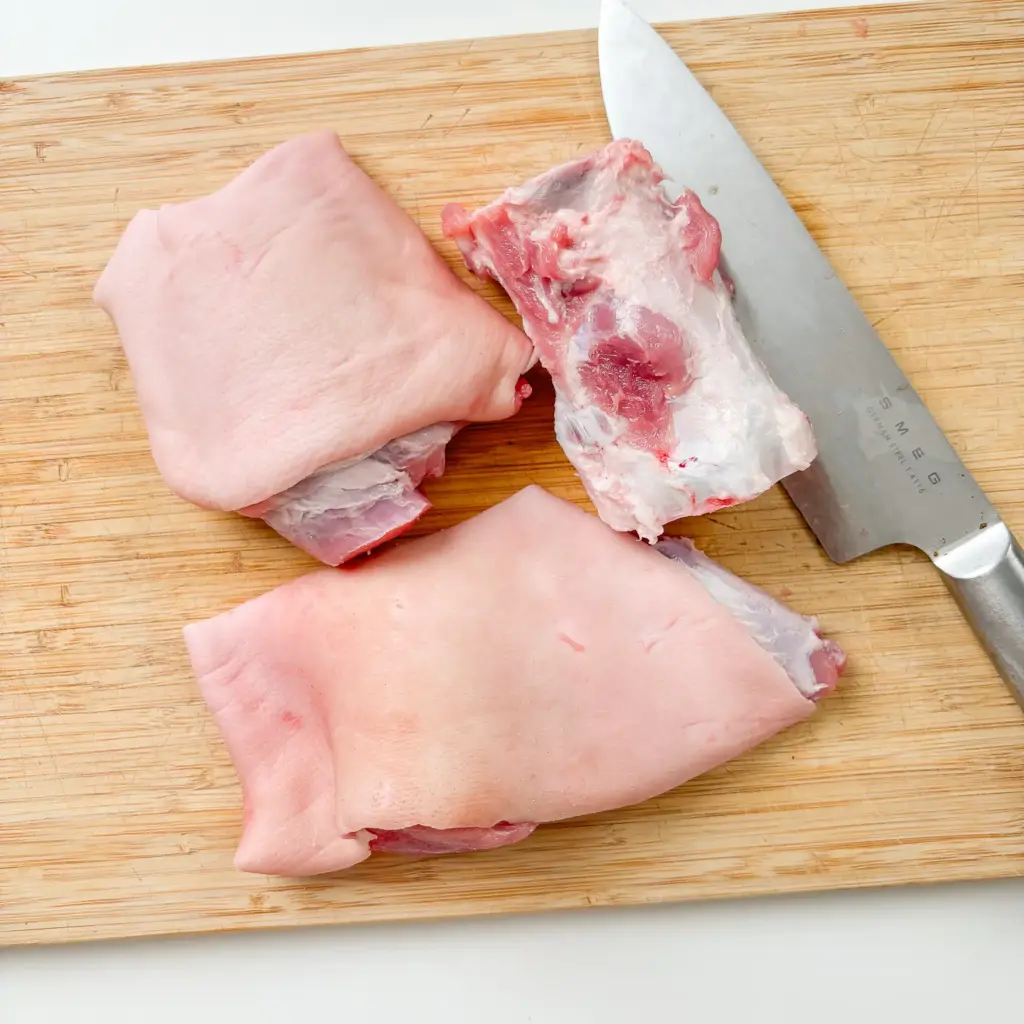
- While prepping the other ingredients, keep the meat in cold water.
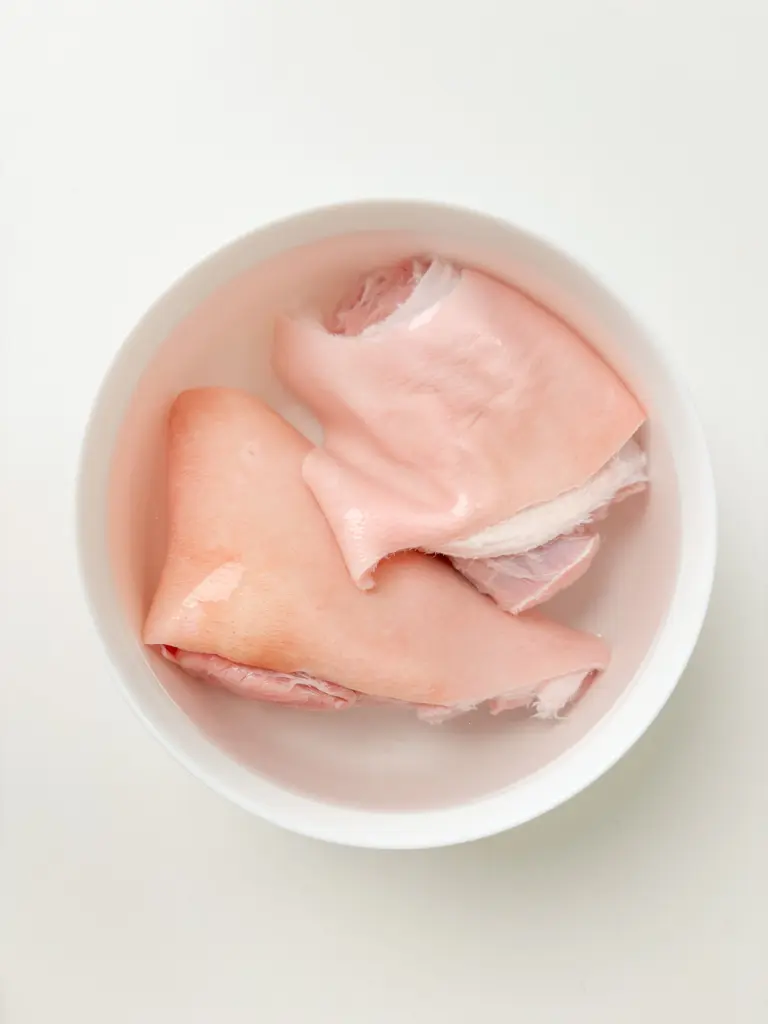
- Prepare the vegetables
- Cut the green onions into large pieces. Slice the onions into 1.5 cm (½ inch) thick rounds. Lightly crush the garlic cloves with a knife, and thinly slice the ginger.
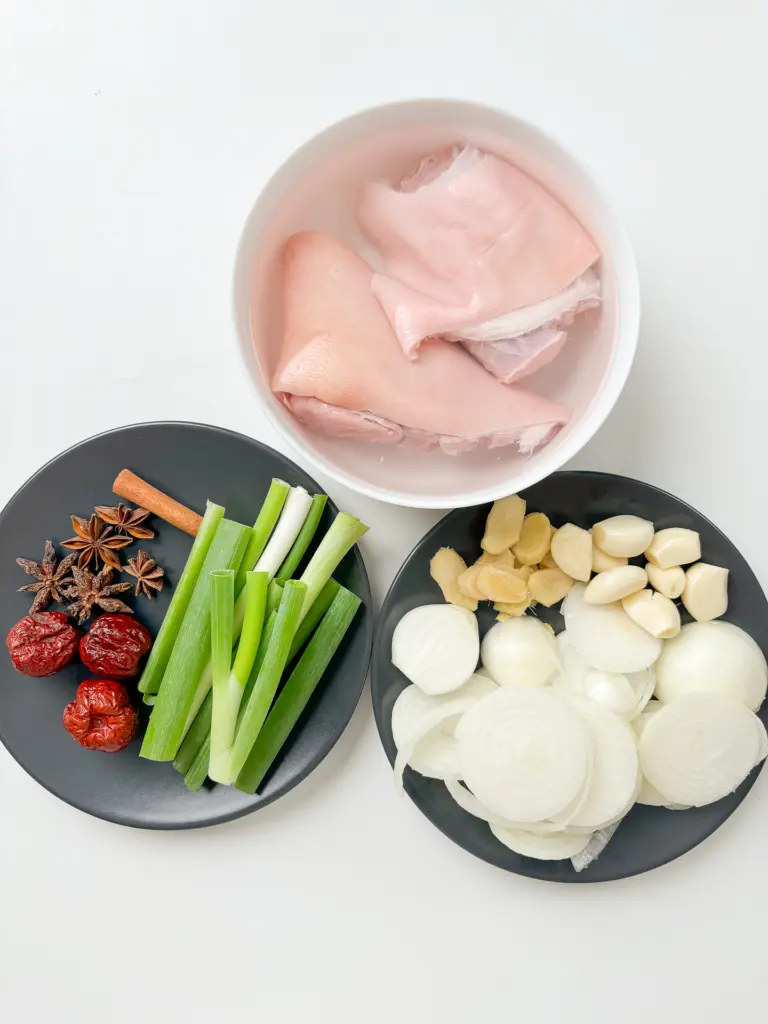
Assemble in the pot
- Place the sliced onions at the bottom of the pot and lay the pork on top. Add the spring onions, garlic, star anise, cinnamon stick, ginger, jujube dates and black pepper.
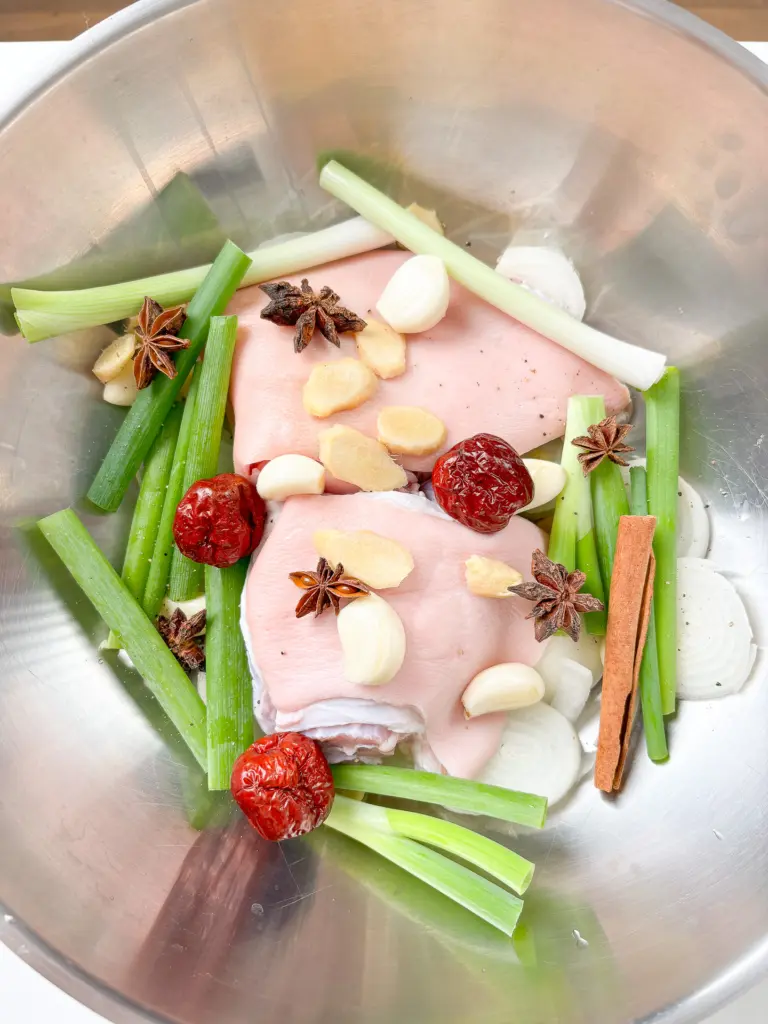
Make the sauce
- In a bowl, mix soy sauce, dark soy sauce, soju (or cooking wine), sugar, corn syrup, plum extract, and water. Pour it over the meat. Add MSG if you want a restaurant-style flavor.

Simmer
- Cover with a lid and bring to a boil over high heat. Once it starts boiling, reduce to medium-low heat and simmer for 50 minutes. Turn the meat over 2–3 times during cooking so it cooks evenly.
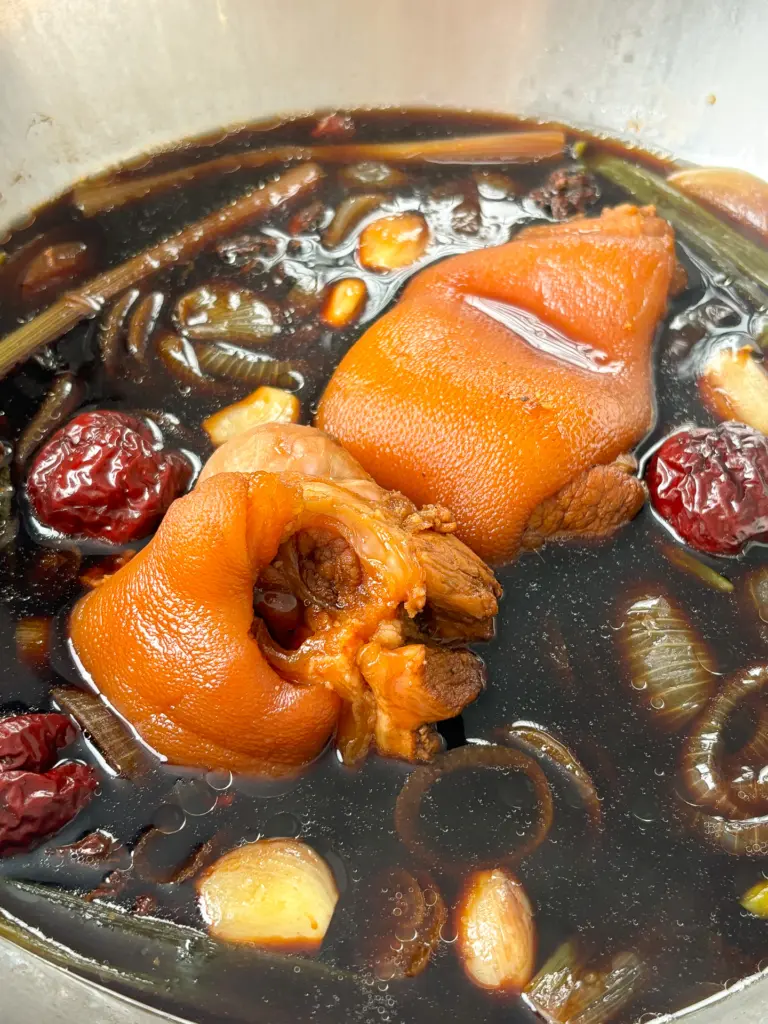
Rest and slice
- After cooking, let the jokbal rest for about 15 minutes before slicing. This helps the meat stay firm and bouncy without breaking apart.
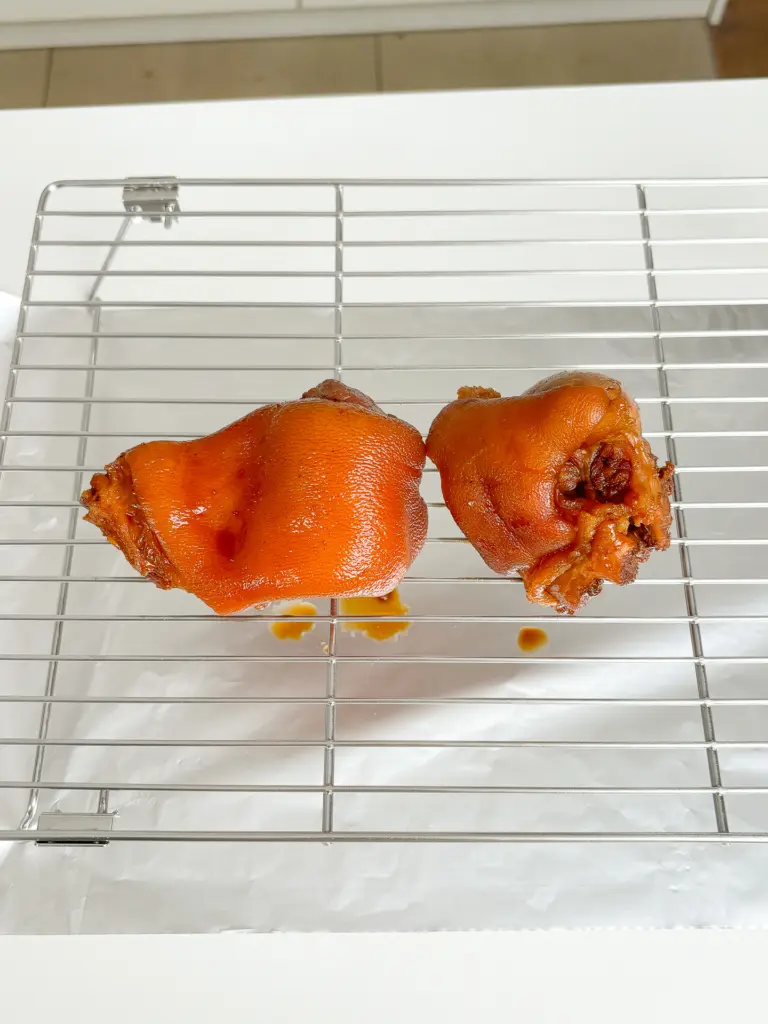
Serve
- The remaining braising liquid can be used as a dipping sauce. It’s rich, savory, and slightly sweet.
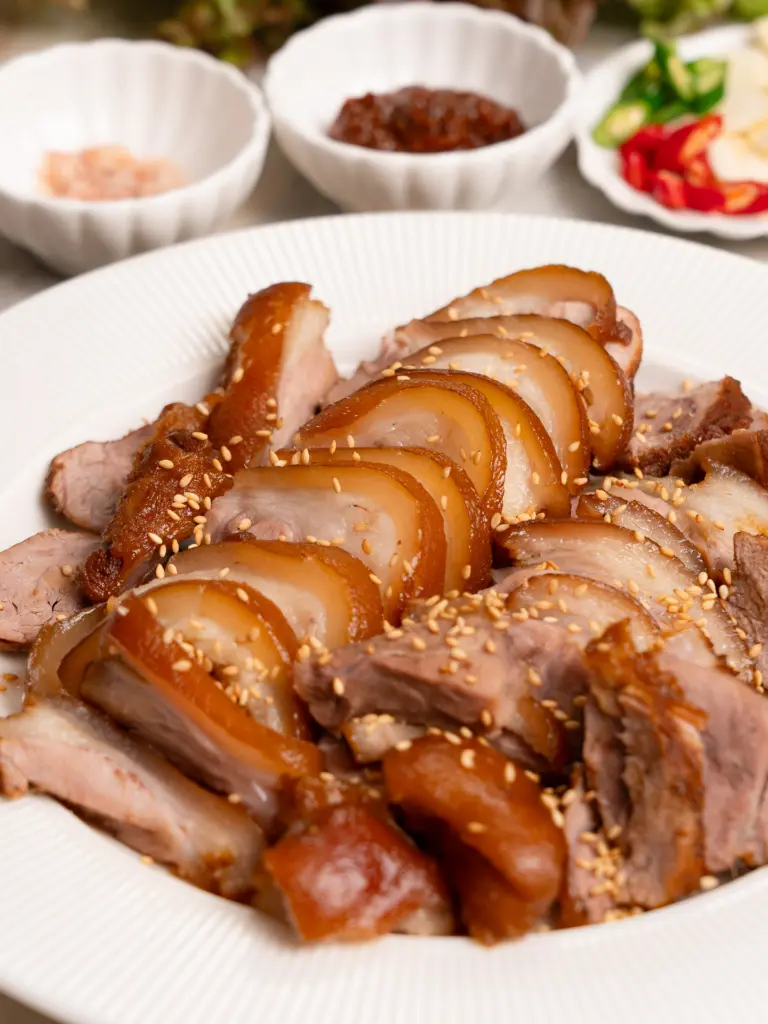
- Additionally, prepare ssamjang, shrimp sauce, and lettuce, and enjoy the jokbal with rice.
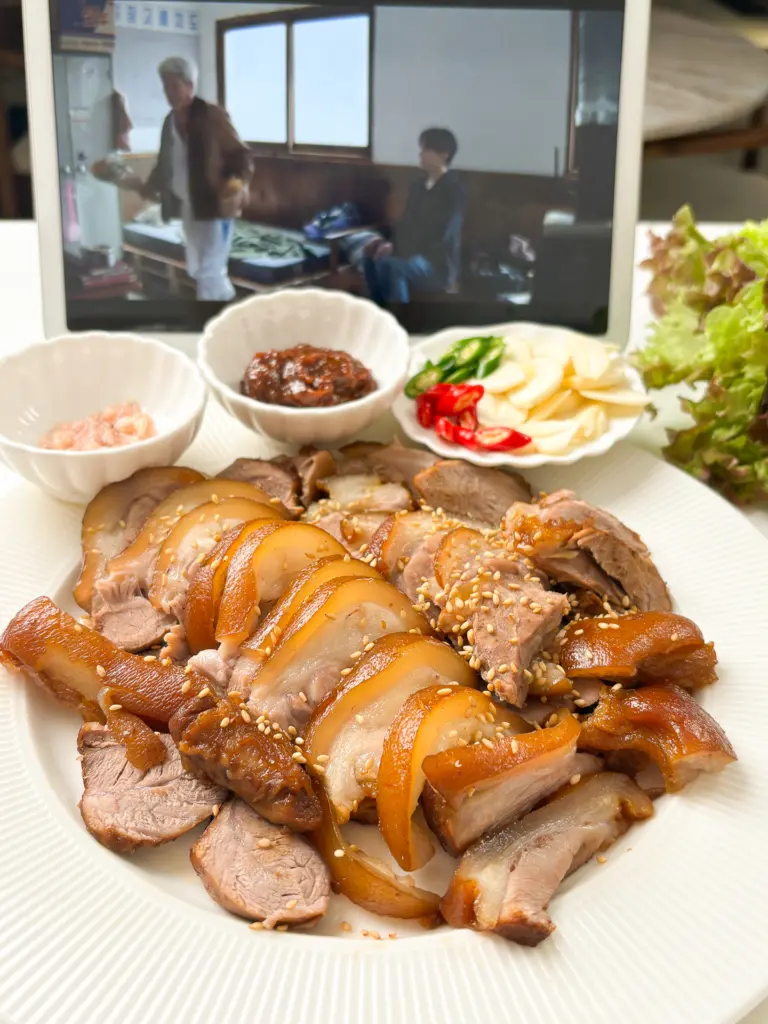
Nutrition
Blonde Kimchi is part of the Amazon Services LLC Associates Program, an affiliate advertising program that allows websites to earn advertising fees by linking to Amazon.com and promoting products.

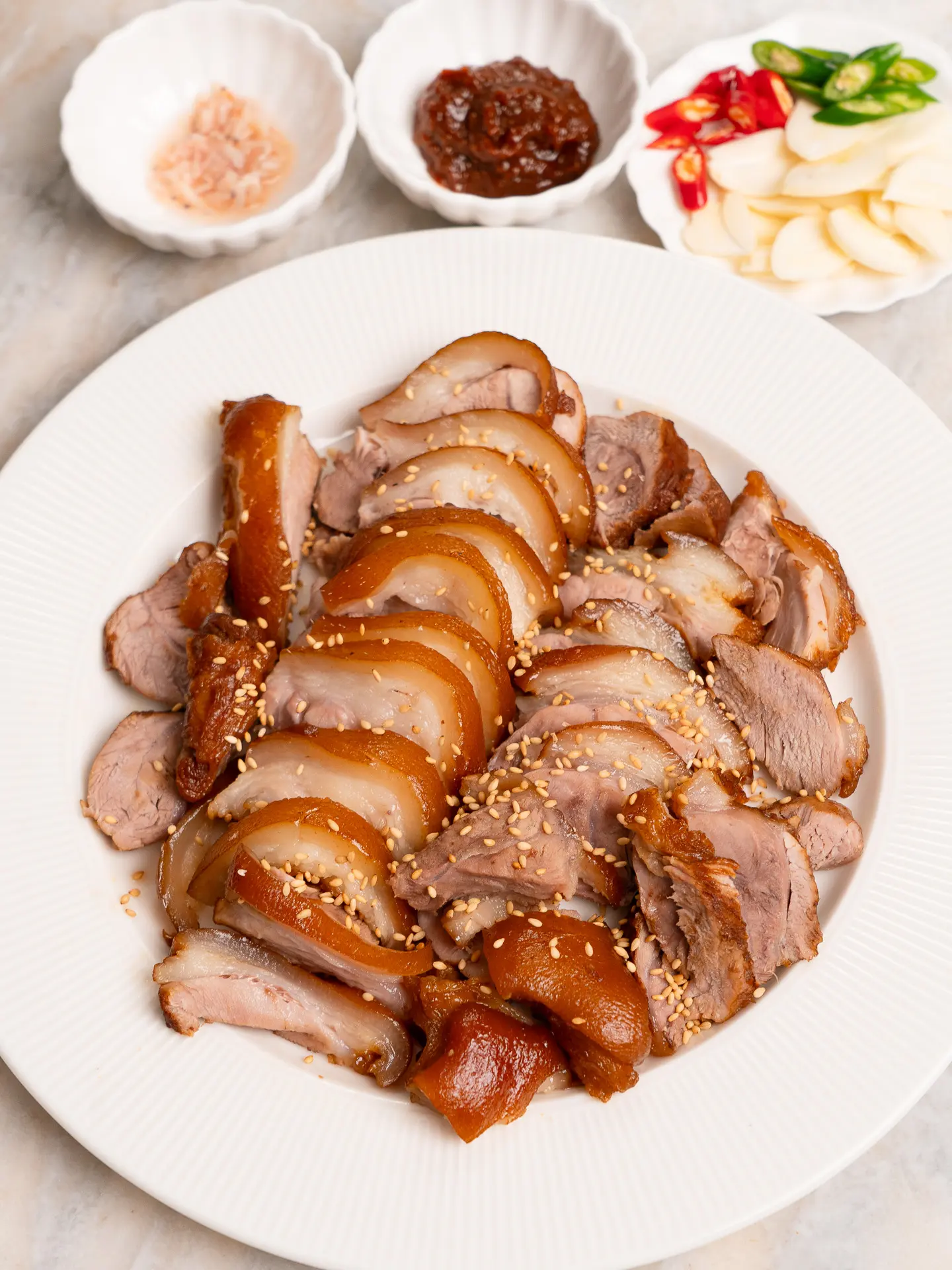
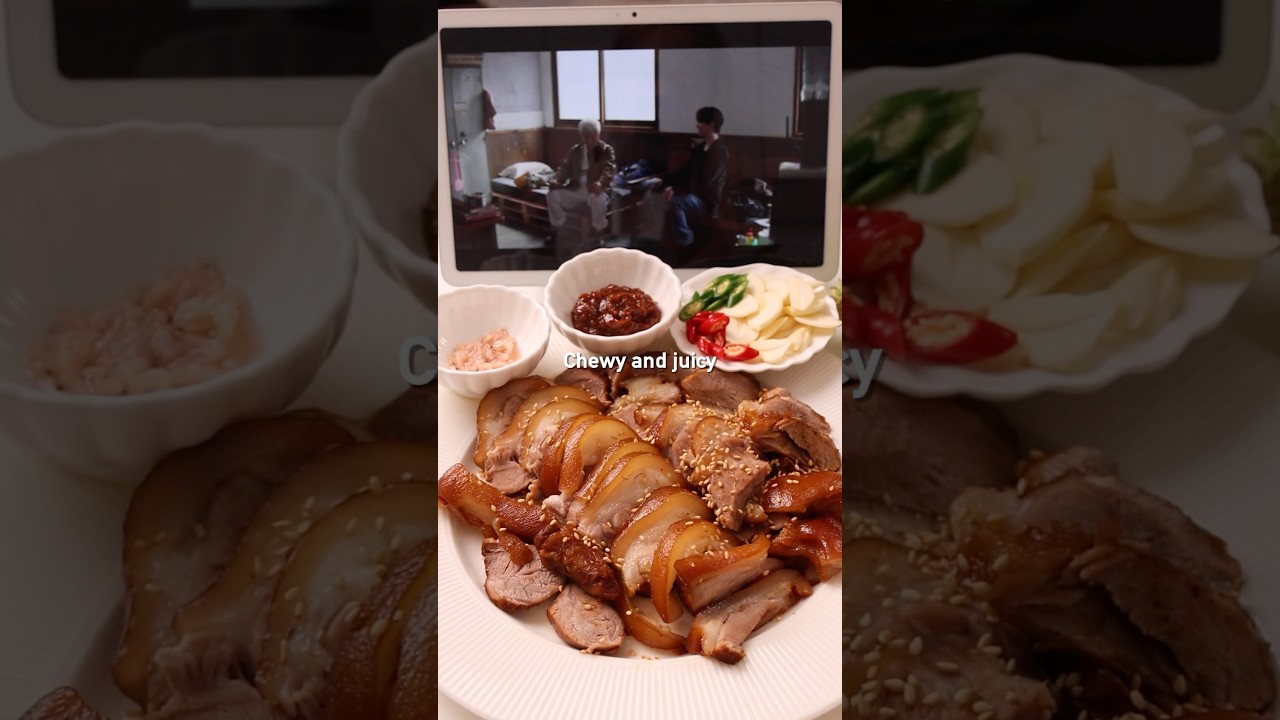





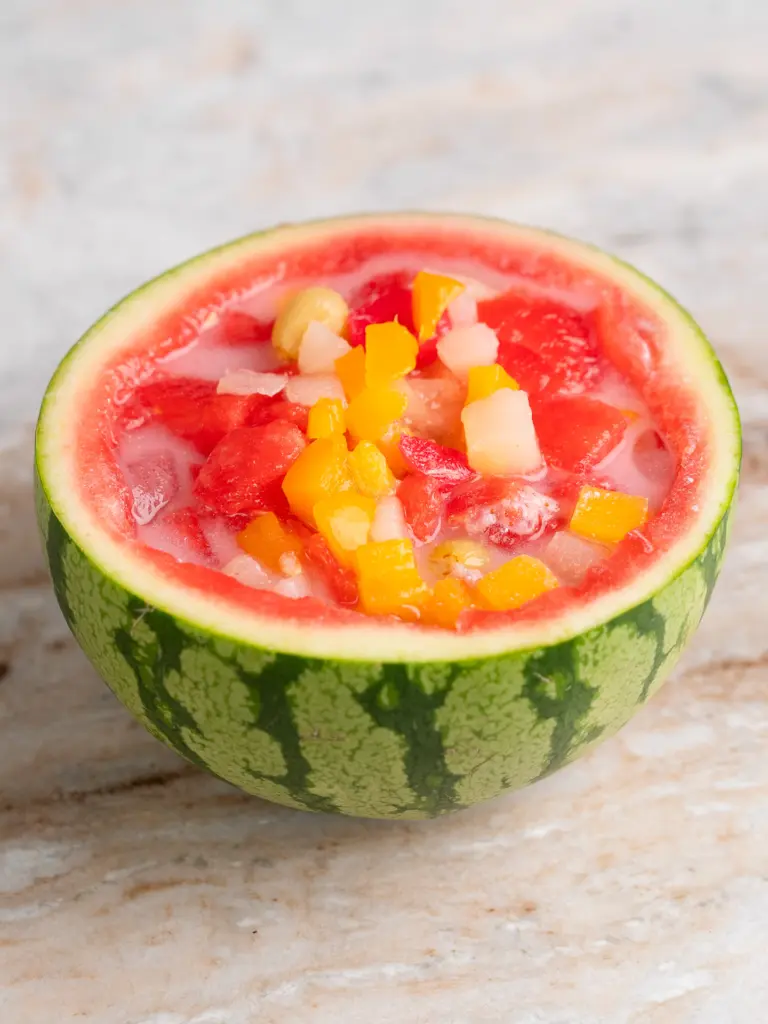
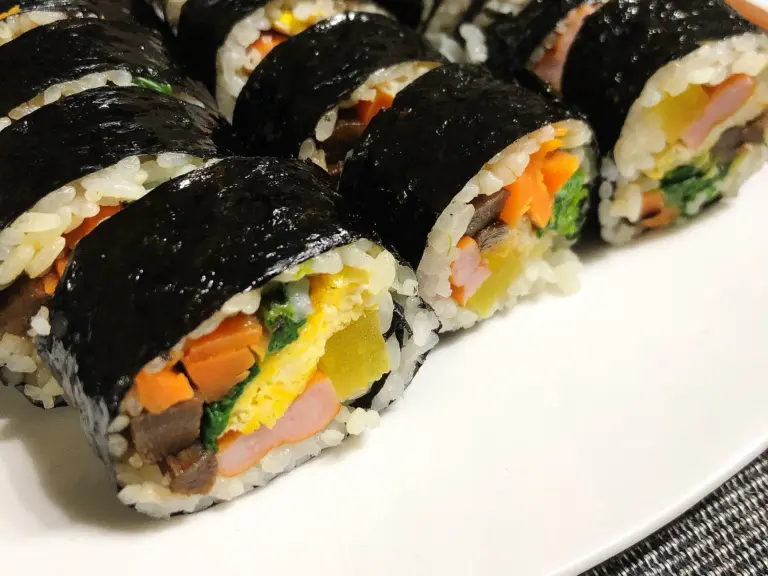
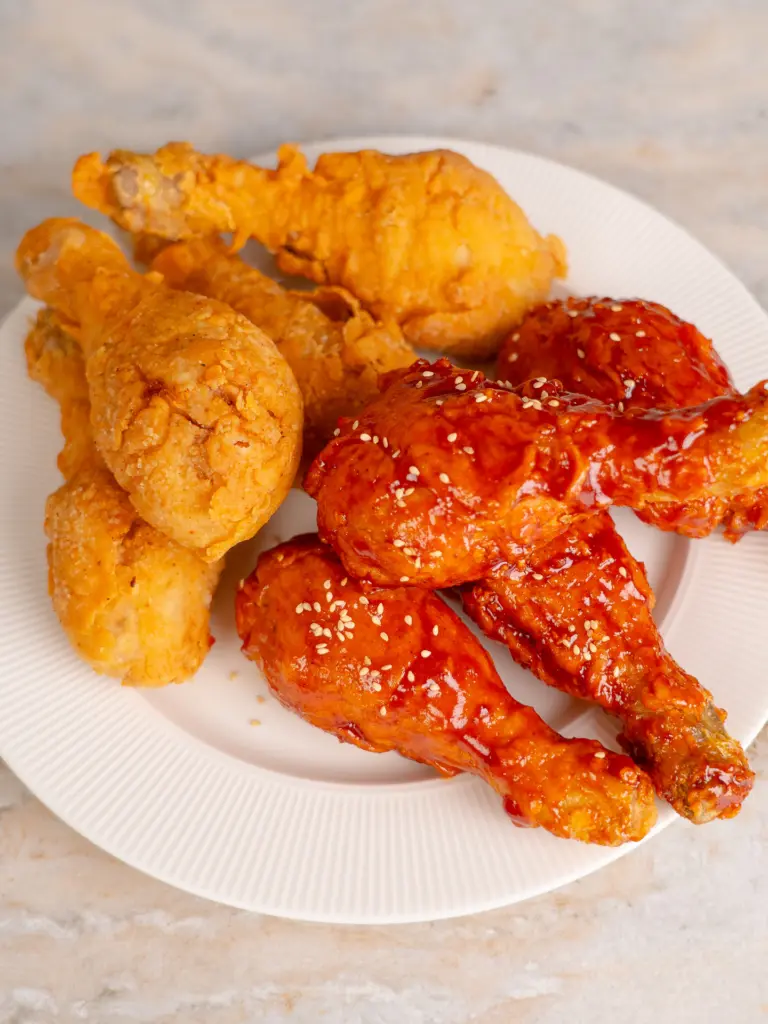
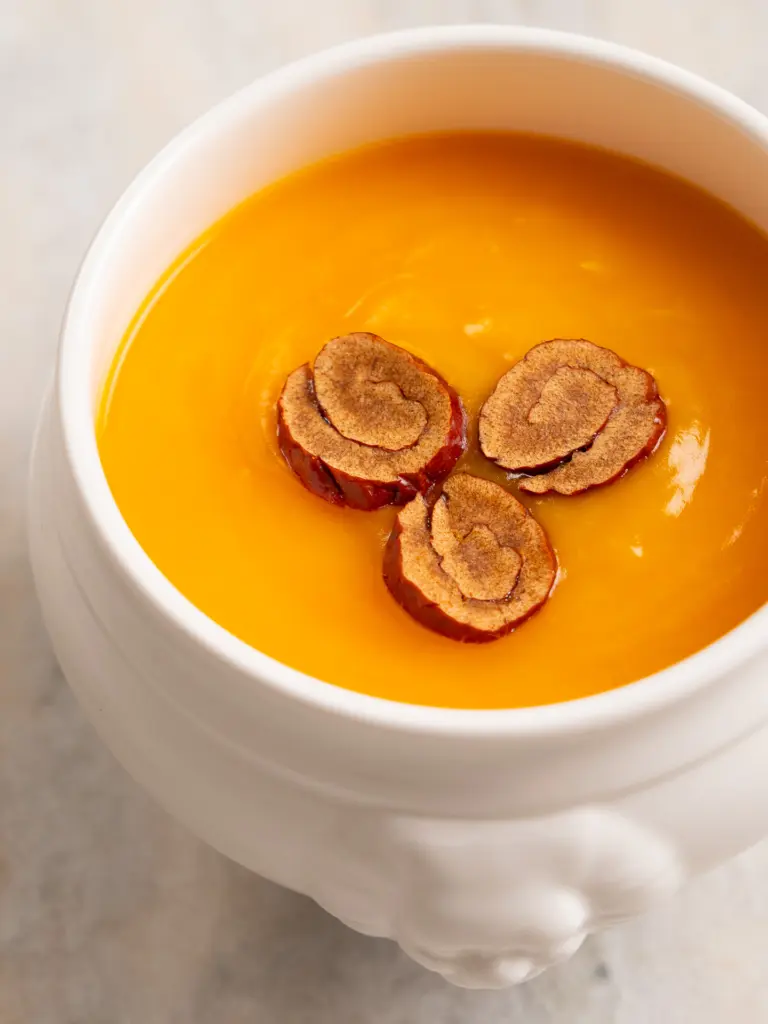

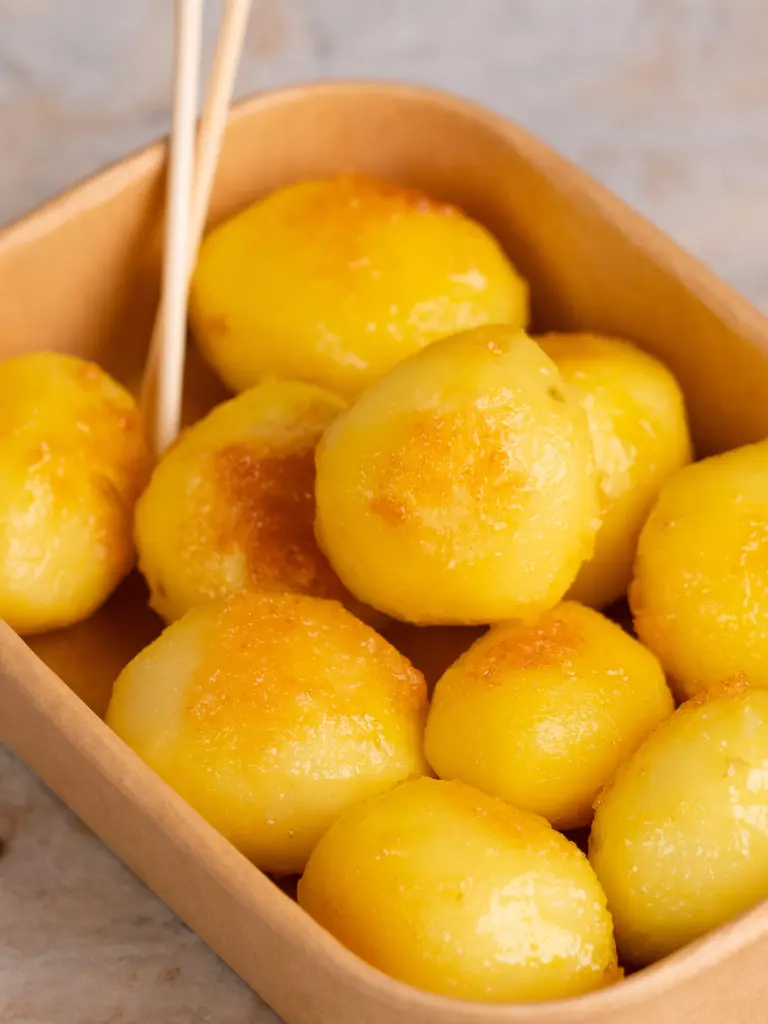
This is honestly the best jokbal recipe I’ve ever tried at home. The flavors taste just like real restaurant jokbal! Super tender, rich, and perfectly seasoned. This boneless jokbal recipe is a must-try!
So easy to make and so delicious! This boneless jokbal is one of my new go-to comfort dishes.